COVER DESIGN CONCEPT
The Arc diagram featured on the cover of ASM’s 2021 Annual Report depicts the infinite possibilities and potentialities of ASM as a Thought Leader providing endless flow of ideas and solutions to grand challenges for matters related to Science, Technology, Innovation and Economy (STIE). Each node represents an expert contributing within and beyond their fields together with other experts with shared values towards a common goal.
SCAN TO READ THE DIGITAL VERSION OF THIS REPORT
‘BUILD INSIDE, DEPLOY OUTSIDE’
About ASM
A Thought Leader in Science, Technology, Innovation and Economy (STIE) towards a progressive, harmonious, prosperous, and sustainable society, nationally and internationally.
MISSION
To be a Thought Leader on STIE, nationally and internationally
To be the Advisory Body on national STIE policy and related matters
To be the Strategic Partner in STIE in Malaysia and globally
To advocate and make STIE a basis for economic development and societal wellbeing, locally and globally
To engage the public through STIE communication
VISION GOALS
To become an independent Thought Leader on STIE, nationally and internationally
To become the trusted Advisory Body on national STIE policy and related matters
To become an influential Strategic Partner in STIE in Malaysia and globally
To become an impactful advocate and make STI a basis for economic development and societal well-being, locally and globally
To become an effective STIE communicator that attracts public engagement
PHILOSOPHY & VALUES ASM STRATEGIES
“Build Inside, Deploy Outside”
What we stand for,
Society-based: placing STIE for societal benefits
Credible: reliable, impactful, and timely
Independent: track and provide input on systemic issues without fear or favour
Evidence-based: ensure what we do is informed by the best available knowledge
Network-centric: dynamic Knowledge
Convergence Platform (as an organisation that connects people together leveraging on the high trust factor of its stakeholders)
Transparent: open engagement and process
Impactful: deploy new and better ways for impactful outcome
Action-oriented: turn initiatives into workable solutions that bring about sustainable change
CORE FUNCTIONS
ASM strives to be the nation’s Thought Leader for matters related to STI.
ASM is committed to pursuing excellence in the fields of SET for the benefit of all.
Independent Systematise ASM as an independent & impactful trailblazer in STIE
Influential
Expanding ASM’s influence as a trusted partner at federal, state & global level
Sustainable Securing sustainable resources for a progressive organisation towards supporting national interest
Agile
Enhancing organisational agility by practising good governance & professionalism
Nexus
Positioning ASM as preferred point of reference in all STIE matters
Proponent
Driving effective advocacy towards future-proof socioeconomic sectors
Convene
Establishing effective science communication platforms with stakeholders at all levels federal, state & global level
12 ACTION PLANS
1 4
To maximize experts’ involvement throughout national STIE planning in generating ideas, thoughts and knowledge
To upgrade organisational practices to adhere to national accreditation and international best practices
2 5
To intensify collaborations in strategic areas with sister academies & regional platforms
To assess & monitor organisational performance internally and externally to meet measurable outcomes and impact
3 6
To undertake demonstration projects that can translate new ideas into action and build capacity with strategic partners to ensure sustainability
To co-create high impact STIE initiatives at localities for transformation of socio-economic sectors
To systematise continuous monitoring & evaluation of STIE ecosystem
To set up a mechanism within ASM to generate revenue and ensure sustainable resources
To imprint multipotentialite qualities among our talent by nurturing high level competencies and capabilities in multiple subjects
To enhance competency & skills of talent for future readiness through foresighting with inclusive participation from the quadruple helix
To support career advancement of young researchers towards instilling the “World Class, Outstanding, Winnable” (WOW) mindset
To create the ecosystem of open science, open access and open innovation through collaborative platforms for disruptive innovation
The Academy of Sciences Malaysia looks back proudly in 2021 as a year of achievements and a year of organisational reform designed to foster even more excellent results. The year 2021 has materialised our capability to move progressively, focusing on undertakings to better society nationwide, particularly in the science, technology, innovation, and economy (STIE) segment. Despite the challenges, especially with the COVID-19 pandemic, I am proud of how the Academy has responded and the significant outcomes we have achieved.
As we endured the pandemic, the Academy of Sciences Malaysia played a proactive role in the Malaysian COVID-19 response by joining the national discourse programmes: immunisation, vaccination, and task forces. ASM, had drafted the National COVID-19 Immunisation Programme (NIP) handbook in collaboration with the Ministry of Health and the Ministry of Science, Technology, and Innovation and translated it into several languages to ensure awareness and understanding among society.
The efforts did not stop there. The Academy was also tasked to chair the Jawatankuasa Pembukaan Pusat Pemberian Vaksin (PPV) mobile drive-through and outreach for the COVID-19 Immunisation Task Force (CITF). We had developed the SOP for Ventilation for COVID-19 and the SOP for setting up COVID-19 PPV at Places of Worship. Our team of data scientists from YSN-ASM also designed the plan for Malaysian drivethrough vaccination centres, which was rolled out nationwide.
I am delighted to make known that ASM’s flagship report, Science Outlook 2020, is a trailblazer document on many fronts. The theme ‘Unlocking the Future’ is the first ASM report to include growth trajectory modelling and strategic foresight to future-proof Malaysia’s STI policy development and implementation. Together with the inputs from our strategic partners and other relevant stakeholders, this is the first Science Outlook report that had adopted the ecosystem approach to scan Malaysia’s progress in the pillars of the economy, society, and environment within 30 years. To date, the report has been downloaded 1194 times from 28 countries.
Academy of Sciences Malaysia continues to be the nation’s STI purpose-driven agency under the purview of the Ministry of Science, Technology, and Innovation. In playing the role of the thought leader and changemaker, the re-establishment of WEHAB++ committee (Water, Energy, Health, Agriculture, Biodiversity) displayed ASM’s focus on Planetary Health and other cross-cutting issues to contribute effectively to the nation.
The re-establishment of the WEHAB++ committee will deep dive exchange of ideas and solutions related to Planetary Health. Following the previous reports and studies that we had done like Science Outlook, Small Interest Group (SIG) on COVID-19, Zoonotic Diseases, Precision Biodiversity and Blue Economy, the Academy had curated the findings and presented a paper on the Planetary Health concept to Malaysia’s High-Tech Nation Council on 5th November 2021. The paper was also accepted to be tabled in the National Science Council meeting in April 2022.
A significant milestone for ASM in 2021 is also visible in the work and policy collaboration with multiple ministries. The Academy has been appointed by MOSTI as a strategic partner to review and update the 2016 draft of the National Nanotechnology Policy and Strategy (NNPS) to develop NNPS 2021-2030. This review provides strategic direction and strengthens the national nanotechnology sector.
Aside from that, the Academy has been working closely with the Economic Planning Unit and the Ministry of Environment and Water (KASA) on the commission study of Water Sector Transformation 2040 (WST2040). As a strategic partner, ASM has been tasked to review and analyse current policies, undertake comparative strategy analysis/business models, study the potential of the nation’s water sector industry, prepare a Transformation Strategy and Initiative Implementation Framework, undertake consultations with Stakeholders and Experts, and prepare a complete roadmap for the National Agenda on the WST2040.
Changemaker Academy of Sciences Malaysia continues to be the nation’s STI purpose-driven agency under the purview of the Ministry of Science, Technology, and Innovation. In playing the role of the thought leader and changemaker, the re-establishment of WEHAB++ committee displayed ASM’s focus on Planetary Health and other cross-cutting issues to contribute effectively to the nation.
















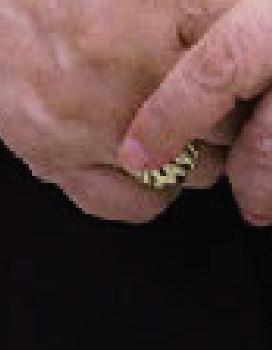




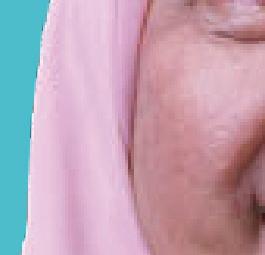











































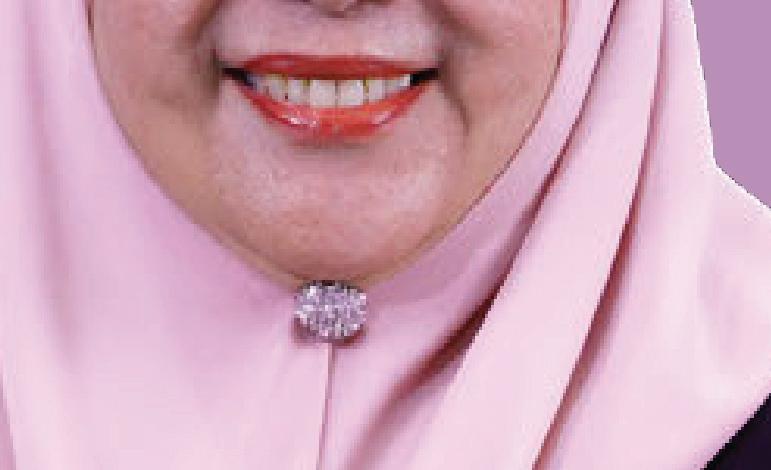













Continuity of reaching out to extensive networking groups globally has always been ASM’s agenda. In adapting to the new norm, the Academy has organised a few breakthrough events to enhance interdisciplinary knowledge sharing, learning and collaboration between local scientists in Malaysia and worldwide. The YSNASM International Scientific Virtual Conference 2021 became one of the highlights that offered an inclusive platform to address national, regional, and global challenges through interdisciplinary collaboration within the ASEAN region.
ASM also partnered with the Mahathir Science Award Foundation in organising the International Conference on Tropical Sciences – Contribution to Sustainability (TropSc 2021) to continue the footprint of championing Planetary Health. The conference focuses on four themes: tropical architecture, tropical medicine, tropical agriculture, and tropical natural resource.
I am also proud to address that ASM’s fellows have been recognised internationally. For 2021, we have our experts representing Malaysia as a member of the UNESCO Open Science Advisory Committee, a member of the World Health Organisation (WHO) Science Council and selected as a Fellow in The World Academy of Sciences (TWAS). The acceptance of our fellows shows how they can share values and wisdom with the global community on STIE.
ASM, in addition, fostered its relationship with its extensive network of partners throughout the year. The significant collaboration with other academy bodies will drive to synergise issues on STI locally and globally collectively. On 6 October 2021, the Academy signed a Memorandum of Understanding (MoU) for Scientific Collaboration in Research to foster the STI collaboration with the Palestine Academy for Science and Technology (PALAST). Our Academy also strengthens its engagement in the effort to cultivate a better bond with different science bodies around the world. In April and July this year, we met virtually with the Bulgarian Academy of Sciences and Academy of Sciences Turkmenistan. The meeting delves into developing scientific ties between Malaysia and the two countries where it would also see the possibilities for future cooperation in specific areas of science and innovation.
At ASM, we are always looking to increase the capacity and capability of the great minds in Malaysia to contribute to a better nation. ASM aspires to strengthen its mark as the thought leader nationwide. With 836 expert networks, the figure currently represents the biggest intellectual gathering in Malaysia under an agency. ASM introduced the East Coast, Sabah, and Sarawak Chapter in 2021 and, in doing so, completed the ASM Chapters nationwide, including the Northern and Southern Chapters.
Following the expansion of our chapters, various programmes had been done extensively to share our insights in the STIE field. ASM had done about 241 activities throughout 2021 that covered programmes, webinars, workshops, and stakeholders’ engagement. This activity has also made ASM more visible to the public. ASM’s social media platforms show significant progress in how we connect with the community. ASM this year has close to 50,000 followers across all platforms such as Facebook, Instagram, Twitter, YouTube, LinkedIn and TikTok.
From the inaugural strategic plan 13 years ago, the Academy has made a lot of progress and received many praises for the work that we had done. The Academy’s journey now continues as it focuses on the second strategic plan, from 2021 to 2025, in which the Academy aspires to play a crucial role in pushing for advancement and elevating itself as a changemaker guided by the WOW mindset (World-class, Outstanding and Winnable).
This strategic plan will focus on five new missions and five new goals to achieve the vision, with a national and international concentration on three STIE impact areas (economic development, societal well-being, and environmental sustainability). I am confident that our Expert Network (Senior Fellows, Fellows, TRSM, Associates, and YSN-ASM) will give their experience and ability to this cause.
Building on ASM’s excellent achievements in 2021, let us continue to strive for greater heights and have more memorable successes in the future.





























































































































































CORPORATE GOVERNANCE





































































































































































































ASM Council together with the ASM Management is committed to improve ASM’s Corporate Governance through best practices. This year, ASM has updated several policies and procedures relevant to financial management, which includes asset management.
ASM Council
The ASM Council established under the Academy of Sciences Malaysia Act 1994 is the decisionmaking body of ASM. It is responsible to carry out the 14 functions of the Academy as well as manage the Academy’s affairs. The Council is responsible to ensure that ASM remains an independent and credible body in championing matters of science, technology, innovation and economy that are of national importance. The Council also administer the ASM Fund.
Composition and Selection of ASM Council
The membership of ASM Council comprises 16 members which includes The President, VicePresident, Secretary-General, Honorary Treasurer and 12 Ordinary Council Members.
ASM President is appointed from among Fellows for a three-year term by the SPB Yang di-Pertuan Agong based on the recommendation of the Minister of Science, Technology and Innovation. ASM President is eligible to be reappointed for the second term, provided that the person does not hold the position for six consecutive years.
Besides the ASM President, the other Council members are nominated from among Fellows to be elected at the Annual General Meeting. Fellows elected for the position of Vice-President, SecretaryGeneral, Honorary Treasurer and 12 Ordinary Council Members are eligible to serve the position for two years. At the end of their term, they are also eligible to be re-nominated for the same position, provided the person does not hold the same position for four consecutive years. The balance of out-going and in-coming members provides sustainability and opportunity to Fellows to take part in the leadership role at ASM while ensuring the continuity of ASM policies.
Hence, ASM Council comprise of Fellows of the Academy.
Each year, a number of Council positions will fall vacant and new members will be elected to fill the position at the Annual General Meeting. The balance of out-going and in-coming members provides sustainability and opportunity to Fellows to take part in the leadership role at ASM while ensuring the continuity of ASM policies.
COUNCIL MEMBERS
1) PROFESSOR EMERITA DATUK DR ASMA ISMAIL FASc President
2) PROFESSOR DATO’ IR DR A. BAKAR JAAFAR FASc Vice-President
3) DATUK PROFESSOR DR AWG BULGIBA AWG MAHMUD FASc Secretary-General
4) DATIN PADUKA SETIA DATO’ DR AINI IDERIS FASc Honorary Treasurer
5) ACADEMICIAN TAN SRI DATO’ IR TS AHMAD ZAIDEE LAIDIN FASc
6) ACADEMICIAN PROFESSOR DATO’ DR KHAIRUL ANUAR ABDULLAH FASc
7) PROFESSOR DATO’ DR AHMAD IBRAHIM FASc
8) PROFESSOR DR AHMAD ISMAIL FASc
9) DR HELEN NAIR FASc
10) PROFESSOR DATO’ DR JAFRI MALIN ABDULLAH FASc
11) ACADEMICIAN PROFESSOR DATIN PADUKA DR KHATIJAH MOHD YUSOFF FASc
12) PROFESSOR DR MAHENDHIRAN SANGGARAN NAIR FASc
13) DR MOHAMAD KAMAL HJ HARUN FASc
14) PROFESSOR DR NOORSAADAH ABD RAHMAN FASc
15) EMERITUS PROFESSOR DR PHANG SIEW MOI FASc
16) PROFESSOR DR YVONNE LIM AI LIAN FASc
















Conflict of Interest
Council Members are required to declare their involvement, directly or indirectly in any of the agenda tabled to ASM Council. Should a Council member declare their conflict of interest, the respective person will be required to abstain from the decisionmaking process and remain absent for the duration of the respective agenda. This will be recorded in the minutes of meeting.
Role of President and CEO
The roles and responsibilities of the President and Chief Executive Officer (CEO) are demarcated. President is the Leader of ASM and leads ASM Council in determining ASM’s direction, policies, principles and stand, and the activities. President also leads discussions on all matters that are brought to the attention of Council. President together with other EXCO members ensures that all Council decisions are translated into executive actions. ASM President carries out the duties on a pro bono basis during the term of his/her appointment and is not salaried by ASM.
Whereas CEO is the chief controlling officer of ASM and is responsible to lead ASM Management and oversee the overall administration matters. CEO’s role includes strategising and translating Council decision into executive actions based on ASM’s existing strategies, policies and procedures. CEO is appointed by ASM Council and is a civil servant salaried by ASM.
Council Meetings and Members Attendance
ASM Council Meetings are to be chaired by ASM President will discuss matters that requires approval, deliberation and notification. Following are reports presented at ASM Council Meetings:
1) Minutes of Executive Committee Meeting (EXCO)
2) Report of Finance Committee
3) Report of Science, Technology and Innovation Policy Advisory Committee (STIPAC)
4) Report of Membership Committee
5) Report of Audit Committee
6) Report on KPI for ASM and Ministry
Besides the above-mentioned reports, ASM Management also tables proposals for ASM to carry out new programmes or studies for the Council’s approval, as well as update on the on-going program or studies.
This year, the ASM Council has convened all its five meetings online. Following are the dates of the meetings:
•143rd Meeting 11 March 2021
•144th Meeting 15 April 2021
•145th Meeting 15 July 2021
•146th Meeting 30 September 2021
•147th Meeting 9 December 2021
The attendance of Council members in 2021 meetings is provided as follows:
Emeritus Professor Dr Phang Siew Moi FASc
Professor Dr Yvonne Lim Ai Lian FASc
Council members are not paid any remuneration apart from the meeting allowances when they attend the Council meetings. Meeting allowances paid are at RM750 per meeting to ASM President while other members are paid RM500 per meeting.
Availability of Information
Council Members are provided online access to the meeting documents at least three days prior to the meetings. Each member is required to study the documents and agenda provided before the meeting for an effective meeting. The Council Meeting document consists of at least the following matters:
•Minutes of the last meeting
•Committee Reports requiring Council’s approval
•Report on ASM programme and studies
Annual General Meeting
The 26th Annual General Meeting which was held online on 24 April 2021 was attended by 224 Fellows. The Meeting endorsed the minutes of 25th AGM and approved the Financial Statements ending 31 December 2020 and the 2020 Annual Report to be tabled at the Parliament. Subsequent to this, the 2020 Annual Report together with the Financial Statements ending 31 December 2020 was presented and approved at Dewan Rakyat on 23 March 2022 and Dewan Negara on 28 March 2022.
Besides that, the 26th AGM elected 29 new Fellows for the year 2021 and in-coming Council Members for the term 2021-2023. Following are details of elected nominees:
Newly Elected Council Members
Secretary General
• Datuk Professor Dr Awg Bulgiba Awg Mahmud FASc
Honorary Treasurer
• Datin Paduka Setia Dato’ Dr Aini Ideris FASc
ASM Council Members
• Academician Tan Sri Dato’ Ir Ts Ahmad Zaidee Laidin FASc
• Dr Helen Nair FASc
• Professor Dato’ Dr Jafri Malin Abdullah FASc
• Academician Professor Datin Paduka Dr Khatijah Mohd Yusoff FASc
• Professor Dr Mahendhiran Sanggaran Nair FASc
• Dr Mohamad Kamal Hj Harun FASc
• Professor Dr Noorsaadah Abd Rahman FASc
• Emeritus Professor Dr Phang Siew Moi FASc
Professor Emerita Datuk Dr Asma Ismail FASc Professor Dato’ Ir Dr A. Bakar Jaafar FASc Datuk Professor Dr Awg Bulgiba Awg Mahmud FASc Datin Paduka Setia Dato’ Dr Aini Ideris FASc Academician Tan Sri Dato’ Ir Ts Ahmad Zaidee Laidin FASc Academician Professor Dato’ Dr Khairul Anuar Abdullah FASc Professor Dato’ Dr Ahmad Ibrahim FASc Professor Dr Ahmad Ismail FASc Dr Helen Nair FASc Professor Dato’ Dr Jafri Malin Abdullah FASc Professor Datin Paduka Dr Khatijah Mohd Yusoff FASc Professor Dr Mahendhiran Sanggaran Nair FASc Dr Mohamad Kamal Hj Harun FASc Professor Dr Noorsaadah Abd Rahman FAScNewly Elected Fellows
Biological, Agricultural and Environmental Sciences
• Professor Dr Ahmad Zaharin Aris FASc
• Professor Dato’ Dr Aileen Tan Shau Hwai FASc
• Professor Dr Amin Ismail FASc
• Professor Datuk Wira Dr Raha Abdul Rahim FASc
• Dr Ramli Othman FASc
• Professor Dr Rosli Md Illias FASc
• Professor Dr Wan Kiew Lian FASc
Chemical Sciences
• Professor Dr Azman Hassan FASc
• Professor Dr Ishak Ahmad FASc
• Dr Shahidah Mohd Shariff FASc
• Professor Dr Teh Geok Bee FASc
Engineering Sciences
• Dato’ Ir Hanapi Mohamad Noor FASc
• Professor Ir Dr Mohd Azlan Hussain FASc
• Professor Ir Dr Mohd Sapuan Salit @ Sinon FASc
• Professor Ir Dr Suzana Yusup FASc
• Professor Ir Ts Dr Zainuddin Abd Manan FASc
Mathematics, Physics and Earth Sciences
• Professor Dr Sidek Ab Aziz FASc
Information Technology and Computer Sciences
• Professor Dato’ Ts Dr Aziz Deraman FASc
Medical and Health Sciences
• Professor Ts Dr Cheah Yoke Kqueen FASc
• Professor Dr Fong Mun Yik FASc
• Professor Dr Lau Yee Ling FASc
• Professor Dr Maznah Dahlui FASc
Science & Technology
Development and Industry
• Professor Dr Aziz Arshad FASc
• Professor Dr Rahinah Ibrahim FASc
• Mr Teoh Lay Hock FASc
• Professor Dr Zakiah Ahmad FASc
Social Sciences and Humanities
• Professor Ts Dr Ooi Keng Boon FASc
• Distinguished Professor Dato’
Dr Rajah Rasiah FASc
• Professor Dr Sarinah Low Abdullah
@ Low Wah Yun FASc
President announced at the 26th AGM, the appointment of two ASM Fellows as Senior Fellows. The appointment is made by ASM Council based on recommendation from a Special Panel. The newly appointed Senior Fellows for the year 2021 are as follows:
• Academician Emeritus Professor Dr Cheong Soon-Keng FASc in recognition of his leadership in medical education and research, particularly in Hematology and stem cell transplantation.
• Academician Professor Datin Paduka Dr Khatijah Mohd Yusoff FASc in recognition of her outstanding contributions in innovative scientific research, particularly in Newcastle disease virus (NDV).
ASM Committees
ASM Council establishes various committees such as working committees, task forces and Special Interest Group to carry out its programmes and studies. As such, ASM Council holds the authority to establish a committee and appoint its Chairperson.
Each committee is represented by members of ASM Expert Network especially ASM Fellows. This year, there were 36 committees, 47 task forces being established by ASM Council. The ASM Council also reviews the performance of its committees from time to time and closes the committees which has completed its task.
Executive Committee (EXCO)
The Executive Committee (EXCO) is responsible to monitor and oversee ASM’s affairs and to support the implementation of ASM functions. The EXCO is often referred to by ASM Management for urgent approval and advise in managing ASM’s day-today operations. The Committee also deliberates and review programme proposals and draft ASM policies prior to tabling the paper to ASM Council for approval.
The EXCO consist of the President, Vice-President, Secretary General dan Honorary Treasurer, who convenes at least four times per year. The EXCO meetings are chaired by the ASM President.
Finance Committee
The Finance Committee is responsible for overseeing the planning, implementation and monitoring of procedures, system and financial reporting related to ASM’s finances.
The functions of Finance Committee comprise the following:
• Arrange and control ASM’s finances
• Consider and endorse the estimated yearly budget and seek the Council’s approval
• Review and endorse the yearly Financial Statements and seek the Council’s approval
• Provide advice related to investment
• Review the investments performance reports of ASM Funds
• Approve finance- and accounts-related policies and recommend the adoption of government circulars if relevant to ASM
• Approve the disposal request of ASM assets and debt write-offs
The Finance Committee is chaired by the Honorary Treasurer and consists of at least six members from among Fellows. The Finance Committee convenes at least six times a year.
Audit Committee
The Audit Committee is established to improve ASM’s internal control and to strengthen ASM’s management and governance. The chair of the Audit Committee is appointed by the ASM Council. The Committee comprises four other members and convenes at least four times a year.
The Audit Committee establishes yearly audit activities, which include audit charter, and conduct study on the capacity and effectiveness of ASM internal control. The Committee reports to the ASM Council should any malpractice is found and requires action.
Membership Committee
The Membership Committee is chaired by the VicePresident with at least eight members, including the Secretary General. The Committee is responsible for overseeing the selection process of new Fellows and appointment of Associates. Besides that, the Committee is also responsible to manage the matters of membership affairs.
This Committee is required to convene at least twice a year to recommend suitable nominees for consideration as Fellows and Associates for ASM Council’s approval.
Science, Technology and Innovation Policy Advisory Committee (STIPAC)
The Science, Technology and Innovation Policy Advisory Committee (STIPAC) coordinates, consolidates and evaluates study proposals or reports prepared by the study committees. STIPAC ensures that all recommendations put forward by ASM are positioned to fulfil the nation’s importance. All proposal papers or study reports must be approved by STIPAC before they are submitted to relevant ministries.
The STIPAC meetings are chaired by the President with at least 12 members. STIPAC members consist of chairs or representatives of eight Disciplines and several other strategic and relevant committees. STIPAC meetings convene at least four times a year.
ASM Management
The ASM Management comprises staff from the Higher Management Group (1%), Management and Professional Group (67%) and the Support Group (32%). The Management team are civil servants appointed and salaried by ASM. Nine percent of ASM staff are permanent appointees, while 91% are appointed under the Contract of Services (CoS) scheme. Thirty-seven analysts, 30 executives and 32 support staff carries out ASM’s studies and programmes, administration, and finances.
The ASM organisation structure was restructured this year, establishing three divisions headed by a Chief Officer each. The CEO is assisted by these Chief Officers to regulate, monitor and manage ASM’s operations.
The STI Strategic Studies, Analytics and Partnership Division engages multiple stakeholders to carry out strategic studies and programmes. The recommendation from the studies on various STIE topics were presented to the Government for adoption. Meanwhile, STIE programmes are implemented to bring science and technology closer to the nation.
The International Affairs and Communication Division is responsible for fostering and maintaining communication with national and international stakeholders. The division carries out these responsibilities via ASM’s various programmes and initiatives. ASM leverages on various platforms and media to curate its content for all.
The Corporate Services Division supports other divisions and units in implementing ASM activities. This division is responsible towards the management of ASM administration, finances, procurements, assets and facilities, human resources and membership affairs.
STI STRATEGIC, ANALYTIC & PARTNERSHIP DIVISION
Chief Strategy Officer (CSO)
Flagship & Commissioned Studies Unit
Knowledge Hub, Data Analytics & Strategic Inputs Unit
Strategic Initiative Unit




From the Desk of CEO
Programmes and Activities
I am proud to report that the Management team has successfully completed its planned programmes despite challenges of post covid. We continued to organise programmes and activities virtually. Although we missed meeting our members of Expert Network and stakeholders in person, the virtual programmes have certainly reached larger audience and had ripple effect impacts.
The launching of the MySTIE 10-10 in 2020 required active engagements with various stakeholders. Thus, ASM conducted 128 engagements on 10-10 MySTIE with federal & state governments, agencies, IHLs of both public & private, industries, professional bodies, corporates, and NGOs.
The year 2020, has taught us to build our resilience and embrace uncertainty. 2021 was even more challenging as expectation to adapt and strive against the challenges were high. Nevertheless, the ASM Management team ushered the year with confidence.
Funding and Operations

ASM recorded an income of RM18.96 million for the year 2021.
ASM receives an annual operating grant for its office operations, supplies and staff emolument. This year, we received operating grant of RM10.74 million which also included allocation for ASM office maintenance. With this allocation, ASM managed to conduct repairing works of electrical, piping, air conditioning and air ventilation at ASM office located at Matrade Tower and Jalan Tun Ismail.
Apart from that, ASM also managed eight commissioned studies entrusted by five ministries or agencies with grant value of RM11.4 million. For full report on ASM financial performance, read page 110.
In 2021, Governments around the world raced against time to provide vaccine, to as many people as possible to save lives in the fastest possible time. We are honoured to be given the opportunity to work with the Malaysian Government in the National COVID-19 Immunisation Programme (PICK). ASM mobilised eight data scientists to provide data analytics to the PICK Committee for an effective implementation of PICK programme throughout the Nation. We were also involved in five initiatives under PICK namely, for Pusat Pemberian Vaksin (PPV) as well as development of SOP for places of worship, ventilation, drive through PPVs and PPVs for people with disabilities.

Apart from this, ASM has also worked on 13 collaboration programmes with the partnership of 14 various organisations which includes ministries and Institution of Higher Learning (IHLs)
I am also proud to inform that ASM achieved all planned Key Performance Index for the year registered under the Outcome Based Budgeting for MOSTI. Following is a snapshot of our achievements:
Studies
3 Achieved
3 Target
Talent Development Programme
3 Achieved
3 Target
ASM Involvement in International Meetings
12 Achieved
7 Target
View page 165 for full list of programmes.

A year of transformation
ASM drafted its 3rd Strategic Plan for 2021-2025. The newly crafted strategic plan paves the way for ASM to be a change maker. Thus, the coming years promises progressive and exciting times for ASM.
ASM Management has persisted in finding creative approaches to translate the knowledge of ASM Expert Network in an easily understandable manner. We managed to set up a studio named Prisma Studio to produce creative works such as podcast, video recordings, live streaming of ASM programmes and photo shoots. I am assured that with this facility, ASM will be able to produce quality in-house production to communicate the work of ASM to general public especially the young.
We also upgraded ASM accounting system to SAGA GRP 9.0. ASM Management is optimistic that with the new system, we will be able to produce accurate, timely and reliable analysis and reports for effective decision making.
Besides, ASM also extended its office premise at Matrade tower providing a more conducive workspace for the management team which includes more rooms for discussions and meetings.
Appreciation
Finally, I would like to extend my deepest appreciation to ASM President and Council Members for their guidance and leadership provided to the Management team. I thank members of ASM Expert Network who have stayed committed with ASM throughout our journey, enabling ASM to achieve its goals.
I am also grateful to the support of enthusiastic and talented ASM team and facilitation provided by colleagues at the ministries. I am confident that ASM will continue to progress making a difference at both national and international level.
VOICE OF REASON
SCIENCE OUTLOOK 2020: UNLOCKING THE FUTURE
The Science Outlook studies takes stock of our successes and understanding the gaps of Malaysia’s STI landscape through a comprehensive, independent datadriven analyses and benchmarking. The findings of these studies provide an understanding on how to increase STI proficiency and to transform the coordination of STI policies as part of the efforts to mainstream STI at all levels in the country.
The Science Outlook 2020 – Unlocking the Future (SO2020), is a shift away from the mould of previous editions in that it documents the progress and development of Malaysia’s STI Ecosystem over the last 30 years since the declaration of Vision 2020 in 1991.
This third edition was made possible through various engagements with stakeholders. Data sets obtained also enabled forecasting the nation’s growth trajectory towards becoming a high-income nation by 2030, as envisaged by the Shared Prosperity Vision 2030 (SPV 2030).
Unlocking The Future
Reviewers
20
Publication & production members
14
Analysts & researchers
26
Working Group Members
5
2 Steering Committee Members
Survey participants Engagements
14
Individual interviews
600 69
1000 96 References Data sources
1
Strengthening STIE ecosystem to support Whole-of-Government and Whole-of-Society approach towards global competitiveness and sustainable development.
To nurture future-ready talent to generate new sources for socioeconomic growth and sustainable development.
5 2
4 3
To institutional strategic foresighting to create a vibrant, agile and responsive STIE ecosystem to set the future direction for the sustainable development of the country.
To establish infostructure as a basic utility and incorporate STIE-driven infrastructure to transition society and enterprises towards embracing the knowledge-based digital economy and services.
To foster a culture of knowledge sharing and strategic collaborations to strengthen local and global STIE knowledge networks in niche areas.
The progress and development are viewed through three Impact Pillars, which are aligned to the national and international targets and aspirations. The Impact Pillars view the impact of STI over 30 years of Malaysia’s development in terms of economic vibrancy, societal well-being, and environmental sustainability. Several gaps were identified in Malaysia’s STI ecosystem that continue to prevent the fulfilment of STI initiatives to move the nation towards becoming an innovation- and knowledge-led economy.
Inconsistent STI planning has led to a stunted socioeconomic and environmental development of the country. Malaysia needs to set STI priorities and directions across multiple agencies and economic sectors in a focus manner; these can no longer remain fragmented. The governance for STI and socioeconomic development must be transparent, accountable, and well-coordinated between the Federal and State authorities. As such, this study proposes crosscutting recommendations that are holistic, dynamic, and ecosystem-centric for Malaysia to step out of the middle-income trap.
10-10 MySTIE Framework
Since the 10-10 MySTIE Framework’s launch in December 2020, ASM has been working continuously towards increasing awareness and understanding by engaging with ministries, state governments, agencies, private sectors, academia, and civil societies. With consistent and synergistic effort from stakeholders, the adoption of the 10-10 MySTIE Framework is hoped to create a systematic approach for Malaysia to be competitive and innovative in the science and technology domain.
10-10 MySTIE Framework being featured in the 12th MP’s eleventh chapter titled Boosting Digitalisation and Advanced Technology. This indicates that ASM’s input was regarded with high value.
Through more than 130 stakeholder engagements including 10 international engagements in the past year, the 10-10 MySTIE Framework has been adapted, implemented and incorporated in 9 position papers, 4 joint ministerial task forces, 6 strategic studies for new policy formulation and national plans; with a visibility of
7,00014,00057
downloadsreaderscountries
The 10-10 MySTIE implementation mechanism comprises six steps:
FOCUS
1
Build an understanding of the emerging global technologies (10 S&T Drivers) and how they impact your core operations and influence key socio-economic areas.
2 PRIORITISE
Identify niche areas for priority investments to build positions of global leadership based on strengths and needs in your core business, in rela-tion to the emerging global technologies.
SYSTEMATISE
3
Define a holistic approach
STI ecosystem enablers) to ensure systematic development that deepens the impact of STI drivers on socioeconomic development.
(8i
The 10-10 MySTIE Framework was showcased at the Malaysia Pavilion during Dubai Expo 2020. In expanding its global outreach, ASM collaborated with MOSTI and Malaysian Green Technology & Climate Change Corporation (MGTC) to curate the content for the international trade and business exhibition showcase.
Additionally, Malaysia was showcased as one of the case studies on best practices related to foresighting in the United Kingdom government’s “Features of Effective Systemic Foresight in Governments around the World” study.
Using the whole of government and society approach, the Framework is intended to boost Malaysia’s global competitiveness by ensuring that STIE development will enhance socioeconomic growth. In achieving these goals, ASM has reached out to pave the next steps by bringing the 10-10 MySTIE to the ground. State governments are now incorporating the Framework in its planning and implementing activities for regional prosperity. With STIE, ASM believes that no part of the community will be left behind as we transition into a sustainable, progressive, prosperous, and harmonious developed nation.
Foster an ecosystem-wide collaboration with key players for the deployment of high-impact projects at identified localities to create multiplier effect for shared prosperity.
Initiate
Conduct
locality specific STIE ecosystems to inclusively harness resources and talent to enhance return on value and improve the quality of life of the rakyat
regular foresighting to ensure the STIE ecosystem is adapting to change and is able to mitigate risks associated with uncertainties and volatilities.
Sustainable Ocean Economy
Blue Economy promotes sustainable economic growth, social inclusion as well as preserving and improving human well-being, social equity and ensuring environmental sustainability of the oceans and coastal areas. Every year, Blue Economy generates a revenue of about USD 3 to 6 trillion globally.
Malaysia possesses an extensive coastal and marine areas of 614,159 square kilometres, almost twice its landmass and the size of its Exclusive Economic Zone (EEZ) alone is 453,186 square kilometres. Being a country with abundance natural resources, Malaysia has a huge potential in leveraging these advantages of the Blue Economy for its economic value and prospects.
population lives along 4,800 kilometres of coastline
MAJOR ECONOMIC ACTIVITIES
















Position Paper Concept













A sustainable ocean economy emerges when economic activity is in balance with capacity of ocean ecosystems to support this activity while remaining resilient and healthy.
Economic Activity + Ocean
Ecosystem Capacity + Resilient and Healthy Ecosystem = Sustainable Ocean Economy
Restoration of Tasik Chini
The sustainability of the Tasik Chini Basin (TCB) and Tasik Chini Biosphere Reserve (TCBR) is crucial to support various ecosystem services including recreation, biodiversity conservation, carbon storage, water quality protection, wetlands conservation, flood control as well as local climate regulation. However, TCB & TCBR are continuously and increasingly threatened by human activities, leading to significant deterioration of their conditions.
Professor Dato’ Dr Mohd Tajuddin Abdullah FASc was appointed to lead the Task Force on Tasik Chini. The Task Force will prepare a strategic advisory paper to restore TCB and TCBR ecosystem as well as recommend strategic governance intervention measures necessary for their sustainability.
Study objectives:
To evaluate related governance instruments on TCB.
To review and determine the impacts to socioeconomic sustainability due to the threats and risks of existing and planned development for TCB.
To diagnose the extent of environmental damage (water & soil) with rapid assessment techniques.
To recommend appropriate restoration approaches to accelerate recovery process.
To provide a brief review on the ecosystem & biodiversity status in TCB.
For this, four study scopes have been outlined in the discussion on TCB and TCBR sustainability;
Expected to be completed by August 2022, the recommendations from this Strategic Advisory Report will use STI to complement existing initiatives to positively influence plans related to TCB and TCBR and to pave a way for development without sacrificing our environment.
Special Interest Group (SIG) on COVID-19
The COVID-19 pandemic has hugely impacted the world and was declared a public health emergency. It has caused an exceptional socioeconomic impact and changed the lives of 7.8 billion people globally.
Following this, the ASM SIG on COVID-19 chaired by Professor Dr Rosnah Mohd Zain FASc was established to tackle the pandemic at a national level.
In its efforts to facilitate public understanding as well as to provide accurate information on the pandemic, the SIG has published several factsheets and expert reviews that addressed various facets of COVID-19 such as diagnostics, epidemiology, therapeutics, and vaccines in an understandable and digestible format.
In addition, the SIG also prepared a Position Paper on COVID-19 that analysed and identified the strengths and weaknesses of the current procedures in handling the pandemic as well as to provide strategic recommendations to prepare for future outbreaks.
Recommendations from Position Paper on COVID-19:
1. Outbreak Preparedness & Response

• Prepare and develop Malaysia’s Strategy for Emerging Diseases and Public Health Emergencies (MySED) III.
• Establish the National Policy and Guideline on National Mobilisation of Resources During Public Health Emergency.
• Integrate public and private healthcare through healthcare system reform.
• Review existing pharmaceutical antiviral stockpiling practices and consider stockpiling other highdemand pharmaceuticals.
• Sustainable funding for stockpiling of essential drugs and items.
• Enhance the Field Epidemiologist Training Program in the MOH.
• Establish Independent Scientific Advisory Group of Expert (SAGE) during Public Health Emergencies.
• Implement Infectious Disease Outbreak Management – Go Back to the Basics.


• Digitalise Public Health Functions and Response.
• Enhance and strengthen public health frontliners for outbreak investigation and response.
• Improve national laboratory capacity and response to major outbreaks.
• Speed up Industry 4.0 Transformation in manufacturing and labour-intensive industries.
• Review policies on unskilled foreign workers to reduce health security risks.
• Develop policies on strategic industries for National Health Security Agenda (NHSA).
1 Expert Review 11 Factsheet
3 Focus Group Discussion
22 Participants
1 Follow-up Questionaire 1 Survey
2. Socioeconomic Sectors
a. Governmental support for SMEs
• Reduce bureaucratic processes
• Transparency and oversight on cash transfers
• Review internal procedures and regulations to facilitate digital adoption
• Referral system for loans as alternative
• Ministry of Human Resources mediation
• Facilitate business registration
b. SMEs
• Review Business Models
i. Adopt new technologies to enhance operational efficiency
ii. Improve risk management
iii. Implement cashless payments
iv. Formalise SMEs in the informal sector
v. Implement high occupational health and safety standards
vi. SMEs must stay informed with government announcements
• Education
i. Enhance internet accessibility and connectivity
ii. Prepare for online teaching and learning
iii. Salvage private higher learning institutions
iv. Implement new policies under the era of pandemic

• Tourism
i. Target Tourism – improving worthiness
ii. Comply with set risk
iii. Smart Tourism
c. Artificial Intelligence (AI) and Big Data Analytics (BDA) Applications
• Capacity and capability building
• Enhance collaboration and data sharing
• Digital Transformation
Ensuring Malaysia’s Resilience Against Zoonotic Diseases
Evidence suggests that COVID-19 is a zoonosis, an infectious disease that is transmitted from animals to humans. This illness appears to be one of the worst zoonotic diseases we have faced in the 21st century. It is crucial and timely for Malaysia to fortify its resilience against zoonoses. We need proactive approach that integrates different models of disease management into one framework to prepare for impending outbreaks and future pandemics.
ASM SIG on Zoonosis chaired by Professor Dato’ Dr Mohd Hair Bejo FASc has prepared a Position Paper that addressed zoonoses issues and provide strategic recommendations to ensure Malaysia’s resilience against zoonotic diseases.
Currently, Malaysia does not have an overarching policy on zoonosis and a consolidated legal framework that provides a concerted direction for the many initiatives. Existing collaborations that target zoonotic disease management should be aligned for a well-coordinated and effective management of impending outbreaks. Moving forward, Malaysia needs to focus on being resilient and agile through the adoption of effective, integrated control measures and prevention strategies to face different kinds of pandemics in the future.
As such, the 8i ecosystem model was used to analyse the issues and gaps in Malaysia’s zoonoses landscape. The interplay of S&T drivers with medical and healthcare as well as environment and biodiversity socioeconomic drivers as outlined in the 10-10 MySTIE Framework will lead to new technology-based, innovative solutions to realise a dynamic and agile ecosystem toward increasing Malaysia’s resilience and agility.
The recommendations are comprehensive and well-coordinated actions to tackle the root causes of zoonoses. Vaccine development, genome banking as well as data sharing platforms were recommended to ensure integrated and synergistic strategies. Comprehensive data arising from integrated, real-time surveillance and monitoring should enable valuable analytics and foresighting toward preventing zoonoses.
Strategic Recommendations from the study:
Ecosystem and Governance
• Strengthen ecosystem and governance
• Enhance the robustness of laws, policies and regulations pertaining to zoonoses
• Revise the Pandemic Preparedness Plan
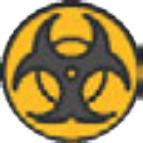
Research and Development
• Form an inventory of studies in Malaysia concerning zoonoses
• Cluster experts from zoonotic field according to focus areas
• Create a platform for information and data sharing
• Utilise Open Science approach to enhance data sharing and research

• Enhance vaccine development
• Incorporate zoonoses in research and development through STI
Environmental Factors

• Improve surveillance to identify wildlife illegal trading or poaching hotspots for better enforcement
• Develope a national level database for environmental genomic and metagenomic data

Capacity and Capability Development
• Develope capacity through multi-faceted processes for a sustainable and transformative workforce
• Increase the capacity of veterinary related programmes
• Increase workforce positions as well as improving infrastructures and equipment

• Strengthen partnerships amongst academic institutions, government, and non-government organisations
• Inculcate wildlife disease knowledge at all levels
Biosafety and Biosecurity Management
• Safeguard the storage, transfer, and handling of pathogens
• Establish a system to manage biosafety and biosecurity risks
• Adopt a top-down approach on laboratory biosafety and biosecurity risk management
[COMMISSIONED STUDIES]
The Ministry of Environment and Water (KASA) appointed ASM as a strategic partner to address the weaknesses in environmental governance in the country by identifying the best legal-institutional arrangement options.
The study calls for the formation of the Federal-State Commission for the Environment (MyFSCE) with the support from various River Basin Authorities or Inter-State River Basin Authorities (RBAs or I-SRBAs) established by the State Governments and various State Environment Enforcement Agencies.
The Task Force concluded that the establishment of a standalone Ministry for the Environment would be insufficient to solve a fragmented governance and all the environmental problems in the country. At the same time, the limited jurisdiction of Department of Environment (DOE) would impede the efforts to enhance environmental governance in Malaysia. The study however, strongly recommends strengthening the enforcement functions of all the other environmental-related agencies at the Federal and State levels.
The study was led by Professor Dato’ Ir Dr A. Bakar Jaafar FASc with 44 Task Force Members comprising of ASM Expert Network and distinguished environmental champions.
[COMMISSIONED STUDIES]
Strengthening of Environmental Governance (SEG) in Malaysia Formulation of the RDICE Roadmap


The formulation of the Research, Development, Innovation, Commercialisation and Economy (RDICE) Roadmap is a study commissioned by MOSTI. The study is co-chaired by Professor Datuk Wira Dr Raha Abdul Rahim FASc and En Jaffri Ibrahim.
This study aims to produce a Roadmap for a holistic and vibrant research, development, innovation, and commercialisation (RDIC) ecosystem through seamless aligning of science, technology, and innovation (STI) to economic planning and goals. This Roadmap will enhance demand-driven research and development, and market-driven delivery system for high tech and high value outcomes as well as improving Malaysia’s global competitiveness.
Completion
This study is set for completion in June 2022.
Roadmap for The National Agenda on Water Sector Transformation 2040
(WST2040)
ASM as the strategic partner of the Economic Planning Unit (EPU) of the Prime Minister’s Office has undertaken the roadmap for the national agenda on WST2040 development study for 20 months, starting from May 2020 to December 2021, with a mission to transform the water sector from an economic enabler into a dynamic economic sector that contributes to the national GDP and also to ensure water security and sustainability for every Malaysian. WST2040 will be achieved through its twin objectives:
1) Water security and sustainability
2) Water as an economic opportunity
A total of 87 strategies, 601 targets and 601 KPIs are to be implemented over the next four Malaysia Plans (MP), starting with 106 immediately implementable projects in the 12th MP. It is envisioned that if the potential of the water sector is fully optimised by transforming the water sector and water ecosystem, Malaysia will be able to achieve a value-add of RM13.3billion, contributing as much as 0.46% to the national GDP by 2040, as compared to a value-add of RM4.5billion. and a contribution of 0.32% in 2019. However, this transformation can only be possible with knowledge, technology and ultimately, a developed and sound water ecosystem that is sustainable, effective and holistic.

The WST2040 study addressed eight additional sub-sectors as follows
• Advocacy, Awareness, Capacity Building and Public Participatory Platforms (AACB)
• Integrated Water Sector Data and RDIC Centre (IWSDC)
• IR 4.0 in the various Water Sub-sectors (IR4.0)
• Water-Food-Energy-Nexus (WFE Nexus)
• Virtual Water and Water Footprint (VW&WF)
• Climate Change Impact and Adaptation (CCIA)
• Alternative Water Financing (AWF)
• Water as an Economic Sector (WES)
National Biotechnology Policy 2.0 (NBP
2.0)
This policy was built upon the previous National Biotechnology Policy 2005-2020. It aims to further develop national biotechnology industry, to transform Malaysia into a progressive, prosperous, inclusive, and sustainable high-tech bio-innovation nation by 2030. ASM led by Professor Emeritus Dato’ Dr Rahmah Mohamed FASc, reviewed the current ecosystem and provided evidence-based recommendations to revive the biotechnology industry.
The study outlined strategic directions of the national biotechnology ecosystem with;
5 Strategic Thrusts
7 5
3
Major Thrusts Strategies
19 Policy Measures Flagship Programmes agriculture biotechnology & food security, healthcare biotechnology & wellness industrial biotechnology & circular economy. encompassing
Enhancement and Harmonisation of National Nuclear Technology Policy (DTNN) 2021-2030
ASM partnered with MOSTI and Agensi Nuklear Malaysia (Nuklear Malaysia) to enhance and harmonise the National Nuclear Technology Policy 2021-2030 (DTNN), led by Academician Tan Sri Dr Ir Ahmad Tajuddin Ali FASc. This policy envisions Malaysia as a leading nation in peaceful uses of nuclear science and technology in line with the UN SDGs by 2030.
Through this policy, Malaysia will be able to harnesses nuclear science, technology and engineering advancement for economic development, knowledge generation and societal well-being. It is designed to leverage nuclear technology assets and knowledge accumulated over time, as well as to identify crucial next generation nuclear technology applications to realise new growth opportunities in Malaysia.
DTNN guides Malaysia to create a vibrant nuclear technology ecosystem. It was formulated through extensive consultations with key stakeholders in co-creating the socioeconomic impact of nuclear technology across multiple sectors.
The policy has outlined three Key Foundations namely Legislation, Regulation & Standards (3S – Safety, Security & Safeguards), Communication, Education & Public Awareness (CEPA) and Future Preparedness with;
121946 4 PrinciplesFlagship Programme Sectoral Initiatives Strategic Thrusts
with 18 Strategiesto be implemented in the next decade (2021 – 2030).
National Robotics Roadmap

Malaysia’s gross domestic product (GDP) grew moderately compared to the East Asia and Pacific region since 2001. Although the manufacturing and services sector contributes almost 79% of GDP, the adoption of high technology in both sectors remains low, at 37% and 20% respectively.
To accelerate Malaysia’s GDP growth, several transformations that address the current challenges are required:
Current challenges that inhibit Malaysia’s GDP growth are:
• Labour productivity growth hovers around 1.8% compared to the 3.6% average of developed countries; we are lagging behind.
• Percentage of low-skilled foreign workers has increased from 34% in 2010 to 46% in 2019. Almost half of Malaysia’s low-skilled workers are of foreign origin.
• There are about 2 million foreign labourers (minimum wage ~RM 1,100/month/worker) resulting in an outflow of around RM2.2 billion per month (RM26.4 billion per year).
• Malaysia’s population will rise to 40 million by 2050; people aged above 65 will increase from 5% to 16.3% in 2050.
• Malaysia is not excluded from unprecedented global crises and pandemics. To date, COVID-19 has resulted in 32,114 deaths.
Robotics is a key technology to address these challenges and catalyst for Malaysia’s aspirations. It will work hand in hand with artificial intelligence (AI) and Internet of Things (IoT) as well as other emerging technologies to advance thenation.
ASM was mandated by MOSTI to develop the National Robotics Roadmap (NRR) 2021-2030 for Malaysia’s robotics development and agendas. In relation to this, the ASM Task Force on Robotics was led by Professor Ir Dr Khairul Salleh Mohamed Sahari and consists of experts from academia, industry and research institute.
NRR 2021-2030 was specially formulated to strengthen Malaysia as a robotics USER by increasing the adoption of robotics technology and building Malaysia’s capacity and capabilities as a robotics developer. Envisioning Malaysia to become a regional robotics hub in Services, Agriculture and Manufacturing by 2030, the roadmap highlighted three high-impact sectors and five strategic thrusts as key pillars, accompanied by 19 strategies and 24 initiatives.
Review of the Environmental Quality Act 1974
The review of the Environmental Quality Act 1974 (EQA1974) is a project commissioned by KASA. ASM was tasked to identify gaps and provide recommendations to strengthen the existing environmental laws.
The steering committee, led by Academician Professor Emeritus Tan Sri Dr Zakri Abdul Hamid FASc has proposed provisions to address the gaps in the law, weakness in its implementation, transparency, access to information and fragmented environmental governance. This shifts the current environmental management approach from reactive approach to precautionary approach.
The revised Act will be submitted by KASA and ASM to the Attorney General’s Chambers in November 2022.
STUDIES] [COMMISSIONED STUDIES]
Hydrogen Economy and Technology Roadmap (HETR)
A Hydrogen Economy envisions hydrogen as a clean, low-carbon energy resource to meet the world’s energy needs, replacing traditional fossil fuels and forming a substantial part of a clean energy portfolio. Like all other renewable energies, hydrogen falls under the category of carbon neutral energy, but the inherent inclusivity of hydrogen makes it beneficial to industry players. Following that, MOSTI is developing a Hydrogen Economy and Technology Roadmap (HETR) to strategically position Malaysia in the highly lucrative global hydrogen ecosystem, where the global green hydrogen market has been projected to reach USD 189.19 billion in 2050. As strategic partner for this roadmap, ASM acts as the advisor to evaluate and analyse current policies, develop governance structure, and organise consultation meeting with experts and stakeholders.
The Hydrogen Economy is seen as a feasible solution to Malaysia’s economic struggles due to the tremendous economic potential brought about by the Global Hydrogen Ecosystem. Undoubtedly, hydrogen economy has the inclusivity to empower economic, environment, social well-being aligning to the 12th MP and the big agenda of Carbon Neutrality by 2050.
This study was chaired by Dr Rezal Khairi Ahmad (Nano Malaysia Berhad), continuing from the SIG on Hydrogen Economy in 2020, HETR is championed by MOSTI’s National Nanotechnology Centre (NNC) with NanoMalaysia Berhad (NMB) as its strategic partner, in collaboration with NanoVerify Sdn. Bhd. (NVSB), Malaysian Green Technology and Climate Change Centre (MGTC) and ASM.
Completion
This study is set for completion in June 2022.
Strategic Inputs to the Government
Technology Commercialisation Accelerator (TCA): Forging Local Innovation Ecosystems for a HighTech Nation to give rise to Innovation STI-Based Enterprises
TCA was proposed to jump-start wealth creation through disruptive local innovations, capitalising on demanddriven R&D and market-driven delivery system approach. It serves the role as a catalyst, enabler, and convenor of innovation to:
• Spearhead economic-oriented research
• Bridge research and technology commercialisation
• Nurture industry-ready talent
As a follow-through to the presentation to the High-Tech Nation Council on 17 December 2020, ASM presented the enhanced proposal entitled Forging Local Innovation Ecosystems for a High-Tech Nation through TCA at the NSC meeting. The proposal’s objective was to obtain the mandate from NSC for the institutionalisation of TCA to drive nation’s competitiveness as a High-Tech Nation. NSC agreed that impactful public-private partnership for Research, Development, Commercialisation, and Innovation (R,D,C&I) has been a long-standing structural issue in Malaysia.
Efforts were then forged to institutionalise TCA through the establishment of Malaysian Research Accelerator for Technology and Innovation (MRANTI) in November 2021. It was established through the merger of two agencies under MOSTI namely, Technology Park Malaysia (TPM) and the Malaysian Global Innovation and Creativity Centre (MaGIC) to accelerate Malaysia towards becoming an innovation-driven economy.
Malaysia Science Endownment (MSE): Harnessing Alternative Financing Tools to Sustainably Power R&D Activities
The Malaysia Science Endowment (MSE) was proposed to develop mechanisms for collaborative STIE networks and sourcing alternative financing sources. The establishment of MSE is necessary to support new STI institutional governance. Funds will be disbursed through the Research Management Unit (RMU), MRANTI or strategic delivery partners in identified priority areas.
In addition, MSE promotes and forges international partnerships for RDCI with regional, international, and multilateral funding programmes for STI across the globe. These partnerships would attract fund to tackle complex socioeconomic and environmental challenges that Malaysia faces as well as based on the nation’s priority areas.
The establishment of MSE is one of the 10 “Leapfrogging Programmes” under the National Science, Technology, and Innovation Policy (NPSTI) 2021-2030. Subsequently, the Cabinet of Malaysia had tasked ASM as the implementing agency to work closely with MOSTI to lay out the groundwork for its establishment in 2022.
Inter-Agency Committee on Global Innovation Index (GII) Monitoring
MOSTI through Malaysian Science and Technology Information Centre (MASTIC) established an Inter-Agency Committee on Global Innovation Index Competitiveness Monitoring in December 2020 to systematically improve Malaysia’s performance in the upcoming editions of the Global Innovation Index (GII) reports.
Establishment of this Committee is also in-line with the target set in the 12th Malaysia Plan to elevate Malaysia’s position to be among the Top 20 nations in the GII by 2025. Currently, the GII 2021 reports that Malaysia is ranked 36 out of 132 countries; this is a decline from the position recorded in the GII 2020 report (33 out of 131 countries). Based on ASM’s analysis, there is no consistent little improvement in our performance to reach Top 20 Innovative Economies over the past ten years.
Within this Committee, MOSTI identified seven strategic partners to monitor Malaysia’s performances in the even pillars as listed in the GII report. ASM has been assigned to monitor the progress within the Human Capital and Research Pillar. This Working Group Committee is was led by Professor Dr Yvonne Lim Ai Lian FASc.
Human capital and research Education
Tertiary education Research and development (R&D)
Infrastructure Information and Communication Technologies (ICTs)
General Infrastructure Ecological Sustainability
Market Sophistication Credit Investment
Trade, Diversification and market scale
Business Sophistication Knowledge Workers Innovation linkages Knowledge absorption
Knowledge and Technology Outputs Knowledge Creation
Knowledge Impact
Knowledge Diffusion
Institutions
Political environment
Regulatory environment
Business environment
Innocation Input Sub-Index
Innovation Output Sub-Index
Creative Outputs
Intagible Assets
Global Innovation Index
Creative Goods and Services
Online Creativity
Several meetings and stakeholder engagements were held throughout 2021 to identify short-, medium- and long-term strategies to improve Malaysia’s score and ranking towards being among the Top 20 Nations by 2025. The Working Group Committee on Human Capital and Research has achieved its milestone in reporting strategies and initiatives towards improving Malaysia’s GII scores and ranking which was set for year 2021. The next direction will be set by the Steering Committee of MOSTI.
Restore and Reconnect Biodiversity, Health and Climate Change for Planetary Health
ASM had presented the paper on Restore and Reconnect Biodiversity, Health and Climate Change for Planetary Health at the High Tech Nation Council (HTNC) chaired by YB Dato’ Sri Dr Adham Baba, Minister of Sciences, Technology and Innovation on 24 November 2021. The paper was presented by the ASM President, Professor Emerita Datuk Dr Asma Ismail FASc based on the findings from several ASM studies namely, Strategic Paper on Precision Biodiversity, Zoonosis-Ensuring Malaysia’s Resilience Against Zoonotic Diseases , Position Paper on Covid-19 and Science Outlook 2020-Unlocking the Future. The recommendations of the paper were approved by HTNC to develop an integrated National Planetary Health Action Plan (PTKPN) driven by science, technology, innovation and economy (STIE) to mainstream planetary health in all national policies and plans through a wholeof-nation approach in addressing ecosystem changes, biodiversity, human health and climate change for sustainable development.


Learning to Transform Data into Valuable Information
Introduction to data analytics training
To empower ASM in the field of data science, ASM have taken on the request from Federal Department of Town and Country Planning Malaysia (PLANMalaysia) to provide data analytics training to their officers.
The training was held via Zoom from 11 August until 25 August 2021. This training was attended by 14 participants (10 from PLANMalaysia and 4 from ASM) from different departments of the organisations, working on different projects and assignments.
Five modules were delivered on foundational data analytics skills such as data driven thinking, gathering and preparation of the data and generating insight.
01 02 03 04 05
Module 1: Data-driven Thinking
In Module 1, participants get an introduction to data analytics and its role in business decisions. They learn how to define the use case, identify problems to know the suitable data and analysis. Participants also learn how to do data storytelling and understand big data analytics environment.
Module 2: Preparing for Data
Module 2 is to explain what and how is data preparation process including data inventory & wrangling, data cleansing, data manipulation and data modelling.
Module 3: Knowing Your Data
In Module 3, participants start applying the fundamentals in advanced analytics and learn how to get insights using an Excel dashboard. The topics include descriptive analytics, correlation and regression, diagnostic analytics and how to visualise in Excel dashboard.
Module 4: Data Storytelling
Module 4 is to get participants started with hands-on activities. They learn how to express their story using data and visualisation tools such as Tableau. The topics include storytelling with data, best practices with data storytelling, introduction to Tableau, basic charts, visual analytics, dashboard and geospatial visualisation.
Module 5: Capstone
This final module is to get participants to apply all the findings and skills they have learned from previous modules. Participants will start to identify suitable use case, problem statement, identify analysis and analytics approach to the use case. Participants will do data preparation and modelling to build visualisation and insights.
At the end of the programme, more than 50% of the attendees have a better understanding of data analytics. More than 40% of the attendees rated as very satisfied with the overall module and program.
The Second Edition of The Malaysian Code of Responsible Conduct In Research (MCRCR)










With abundance of research in universities and research institutes, it is important to ensure all research are carried out with the greatest integrity. Thus, National Committee on Research Integrity (NCRI) was established and endorsed by the National Science Council to not only educate and nurture the researchers from research entities and institutions, but also to increase the awareness of the best practices to the media and the public.
In realizing this, Malaysian Code of Responsible Conduct in Research (MCRCR) had been established to inculcate ethics and accountability in performing research. This guideline provides a comprehensive, robust, and contextually appropriate standard to be followed by the researchers. Thus, researchers will be well informed on how to align to the best practices in concurrence with international standards and practice, yet congruent with local ethical and cultural milieu and legal requirements.
In aligning with this, MCRCR handbook had been published and with the addition of a new content, the 2nd edition of the MCRCR handbook was officially launched during the opening ceremony of YSN-ASM International Scientific Virtual Conference (ISVC) on 29 March 2021 by YB Datuk Hj Ahmad Amzad bin Hashim, Deputy Minister of Science, Technology and Innovation. He emphasized the importance of integrity among local researchers and how the MCRCR code will aids to enhance science governance in Malaysia via transparency and accountability in research & development (R&D).
In addition to the book, MCRCR Committee also provided the MCRCR training for all researchers at public and private IHLs, research institutes (RIs) and agencies/bodies/research centres. 2021 marked another milestone for the committee with the development of online course of MCRCR that can be access via openlearning.com. This will enable easy access for researchers from all around Malaysia to attend the course at their own convenience.
2021 National Science Challenge: Caring for Nature Through Science
STI advancements has brought about massive improvements to the economy and quality of life. With the theme ‘Caring for Nature Through Science’, this year’s NSC challenged students to be innovative, and creative in coming up with ingenious solutions in three areas: agriculture & environment, climate change, and public health. This year, NSC upped the ante with industrial involvement by collaborating with Collaborative Research in Engineering, Science and Technology (CREST) and Malaysian Society for Microbiology. The finalists were mentored by the industrial experts. A series of workshops provided by CREST were attended by the finalists, teaching them design thinking.
35% Male 2,124 students
65% Female
706Teams
The Grand Final was held virtually on 9 October 2021, graced by the MOSTI Minister, YB Dato’ Sri Dr Adham Baba. Although it was held online, the momentum of the competition was still felt between the finalists. During the competition, finalists were required to answer an online quiz on physics, biology and mathematics and pitched their project prototypes. Kolej Yayasan Saad, Melaka was crowned the Champion for the third time in NSC’s history. They brought home the Prime Minister’s Challenge Trophy, RM 6,000 ASM-NSC Educational Award, a laptop, and a certificate of achievement.
20Teams
International Conference on
The inaugural International Conference on Tropical Sciences (TropSc) jointly organised by the Mahathir Science Award (MSA) Foundation and ASM was held from 25 to 27 October 2021.
TROPICAL AGRICULTURE TROPICAL ARCHITECTURE & ENGINEERING

TROPICAL MEDICINE TROPICAL NATURAL RESOURCES


YOUTH RESILIENCE, CLIMATE CHANGE AND OPEN SCIENCE



The virtual conference provided a platform to bring together stakeholders to position the Tropics in the context of global development and identify needed interventions by the government, private sectors, and academia to advance the region in planetary health approach. At the end of the conference, a communique with the main messages of the conference was presented by the Chair. It is also a call for greater focus on the challenges of the Tropics.
The conference was generously supported by platinum sponsor - the International Science Council Regional Office for Asia and the Pacific (ISC-ROAP), and thematic sponsors -Sunway University and Tenaga Nasional Berhad (TNB). In addition, 15 strategic partners consisting of universities, research institutions, corporations and individuals supported the conference.
48 Countries 26 Sessions 70 Speakers
954 Participants Conference
25-27 October 2021
Minggu Sains Negara (MSN)
The theme for the fourth Minggu Sains Negara (MSN) organised by MOSTI this year is “Science for Health”. The programmes was organised from 1-7 April 2021, ASM organised four programmes in-conjunction with MSN 2021 virtually.

Four programmes that captured public interest in STEM organised by ASM;
• Science Café titled Universe of STEM has featured three YSN-ASM speakers: Dr Nurbiha A. Shukor, Dr Nur Adlyka Ainul Annuar, and Associate Professor Dr Ho Wai Shin.

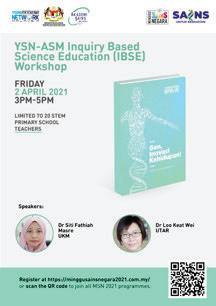
4 Programmes 715 Views Programmes



1 Science Café
1 IBSE Training
• Inquiry Based Science Education (IBSE) workshop involving 16 STEM teachers which were nominated by the National STEM Centre. The participants were trained by two YSN-ASM trainers: Dr Siti Fathiah Masre and Dr Loo Keat Wei with YSNASM IBSE modules titled Gen Inovasi Kehidupan and Begitulah Sang
Suria



• Webinar on “Towards a Fairer and Healthier Tropics”, in collaboration with MSAF.

1 Research Synergy Sharing
1 MSAF Webinar
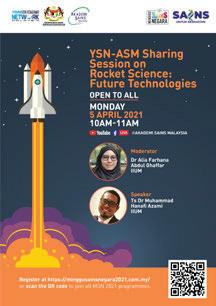
 • Rocket Science talk delivered by Ts Dr Hanafi Azami.
• Rocket Science talk delivered by Ts Dr Hanafi Azami.
ALANGKAH Virtual Exhibition
The ASM ArtScience™ Prize was organised for the first time in 2020 to recognise talents and creative works from the growing community of the artist-scientists.
In conjunction with this, ASM launched an ArtScience™ Virtual Exhibition on 8 November 2021 in collaboration with Maybank Foundation and Balai Seni Visual Negara. This exhibition showcased thirteen shortlisted works of the ASM ArtScience™ Prize 2020 on a virtual platform.
ALANGKAH which is the Malay expression equivalent to inducing awe was selected as the theme to represent the exhibition. It depicts an awe-inspiring realm while observing the ArtScience™ works that had been creatively depicted as being in the digital realm of a brain. The 2021 ArtScience™ Virtual Exhibition can be visited at http://www.maybankfoundation.com/mbfvr/ alangkah/.
Viewers can immerse themselves in a world of art, science, and metaphor through a collection of digital interactive exhibition. They can explore all the thirteen artworks by exploring the labyrinth of the brain onscreen. In conjunction with the exhibition launch, ASM organised the second episode of its ArtScience™ Webinar Series on Transcending the Arts and Sciences, entitled: “Exploring the International Landscape of ArtScience”. This webinar featured local and international speakers who discussed the multifaceted ArtScience scene across an international landscape.
Webinar Series on Transcending the Arts and Sciences




The 2021 ArtScience™ Transcending Arts and Sciences Webinar Series celebrated the individuals’ perspective and perception on the merging of Arts and Science. This webinar aims to cultivate the appreciation of arts towards acculturation of science, consequently, build a community that explores ArtScience. The first episode of this webinar series also featured the juries and winners of ASM ArtScience™ 2020 Prize.
There were two sessions to this webinar: first, the panellists’ perspective was given in expressing ArtScience through their works; then, two jury members shared their insights on the evaluation process of ArtScience™ 2020 Prize.

The winner of the 2020 ASM ArtScience™ Prize, Dr Ahmad Hanif Ahmad Baharudin and his team had placed art and science elements in their work titled “Digital-Tropical Breathing the Waves”. Meanwhile, the Rising Star Award Winner, Dr Roopesh Sitharan and his team had chosen to utilise Artificial Intelligence (AI) through their project titled “Artificial Autonomy and the Question of Subjectivity in AI”.

Top Research Scientists Malaysia (TRSM)
Through the Top Research Scientists Malaysia (TRSM) initiative, prominent Malaysian research scientists who are active and have outstanding achievements and contributions in R&D will be recognised. The online repository of the recognised scientists is a hub for knowledge dissemination that spurs STIE growth in Malaysia. Malaysia’s STIE development is growing rapidly, and these prominent Malaysian research scientists play a huge responsibility in its socio-economic development. Hence, Malaysian leading scientists has made valuable efforts to change the landscape of STIE through their disruptive research and drive Malaysia through an innovation-led economy in achieving high-tech nation status by 2030.
5,816133
5,45222 registered users as of 2021
total active TRSM recipients completed researcher’s data and information TRSM recipients in 2021
Active TRSM Recipients by Discipline Group:
20 Biological, Agricultural and Environmental Sciences
9 Chemical Sciences 67 Engineering Sciences
12 Information Technology and Computer Sciences

9 Mathematics, Physics and Earth Sciences
11 Medical and Health Sciences
2 Science & Technology Development and Industry
2 Social Sciences and Humanities
Young Scientists NetworkAcademy of Sciences Malaysia (YSN-ASM)
The Young Scientists Network-Academy of Sciences Malaysia (YSN-ASM) has developed and nurtured the resilience and agility of prominent young scientists in implementing, advancing, and creating awareness of science in the community. YSN-ASM bridges institutions, industries, and organisations to implement impactful programmes and other engagements throughout the year, virtually and physically. At its standing members of 225, YSN-ASM is proud to represent the young voices that are committed to educate society on STIE.
In line with YSN-ASM’s Strategic Plan 2018-2021, this pool of talented young scientists is actively involved in research collaborations, policy consultation, and other activities at the national and international levels. Throughout its nine years of operations, YSN-ASM has reached a significant milestone by having strategic collaborations with other prestigious entities in championing STI. YSN’s credibility was proven when organisations such as L’Oréal-UNESCO, Petrosains, Merck Sdn Bhd, National STEM Centre, and Palestine Young Academy chose to collaborate with YSN-ASM. This momentum needs to be sustained to achieve higher impact and visibility in the society.
YSN-ASM Strategic Plan 2018-2021 as follows
SP1: Researchers Empowering young researches as strategic partners and agents of changes in shaping the national research agenda.
SP2: Researchers Ecosystem Fostering integrity and research excellence support network throughout the ecosystem.
SP3: Progressive Society Building a progressive society that embraces STI as a way of life.
SP4: Glocalisation Playing a prominent role in international local alliances to tackle national and global challenges.
Activities
YSN-ASM Chrysalis Award 2021 - Take Flight: Transformation Above and Beyond PhD
Chrysalis Award is one of YSN-ASM’s flagship programmes. This award is organised specially for young researchers in their final year of PhD to empower and align them to the Malaysian STI ecosystem. This leadership programme provides the opportunity for them to gain relevant transferable skills and fortify their networking with outstanding local scientists. The programme features a series of online skills development workshops. These young researchers were also given the opportunity to obtain a gainful placement at prestigious fellowships or internships.
Several of these young researchers’ aspirations in building their career were materialised through their involvement in Chrysalis Award. The 2020 Chrysalis Award finalist Dr Tan Li Vern successfully embarked on his career as a researcher at Vitrox Corporation Berhad. In the same year, two other finalists Dr Wan Arif Aziz Japar and Dr Lam Jia Yong have been selected to participate in 2022 Global Young Scientists Summit. This shows that the Chrysalis Award is a programme that allows talented researchers with enormous potential to gain a foothold in the global arena.
Science Café
As one of YSN-ASM’s signature programmes, this programme presents fascinating science topics to the comfort of Malaysians’ home through Facebook Live. This programme has expanded its accessibility by having newer offshoots like Science Café Penang and Johor alongside the main Science Café conducted in Kuala Lumpur.
FIRST PLACE WINNER: 38
Leong Wai Heong PhD in Applied Science (Environmental Sciences)
HiCoE Centre for Biofuel and Biochemical Research
Universiti Teknologi PETRONAS
13 10 Number of applicants
Workshops;
•1 ice-breaking session
•1 Pitching Briefing Workshop
•1 Sharing of the Previous Winners
Workshops & Sharing Sessions
3,300
Facebook Views
87 Science Café KL Science Café Penang and Johor Talks
2021 YSN-ASM Virtual Colloquium - Science: The Nation’s Hope for a Better Tomorrow.
The 2021 YSN-ASM Virtual Colloquium was conducted from 10 to 12 December 2021 to reinforce YSN-ASM’s influence and visibility as a young scientists’ platform. In anticipation of its 10-year anniversary in 2022, YSN-ASM members brainstormed various impactful programmes that align with ASM’s Strategic Plan 2021-2025.
During the Colloquium, an MoU signing ceremony has formalised ties between ASM, Petrosains Sdn Bhd, and Merck Sdn Bhd. This ceremony highlights a continuous collaboration between these strategic partners to materialise opportunities of achieving common goals in supporting ASM’s vision to become a changemaker in the STIE landscape.
Junior Science Artist Competition Collaboration with International Parties
The Junior Science Artist Competition is a drawing competition that was organised from 7 September to 15 October 2021. This competition encourages children to express their creativity and innovative ideas through art. With the theme ”After Pandemic, My Future with Science and Technology”, this competition engaged primary school students to show how the pandemic changed their perspective of science and technology in shaping their dreams.
1st Jarrell Chong Yan Shen
St. Joseph’s Private Primary School
2nd Fan Candice
SJK (C) Keh Seng Melaka
Winners Category A (7-9 Years Old)
3rd Anushri A/P Logendran SK Taman Perling
1st Mak Yu Dern
SJK (C) Chung Hwa 1
2nd Teo Zhao Qian
SJK (C) Cheng Siu 1
Winners Category B (10-12 Years Old)
3rd Chin Hay-Ly
SJK (C) Pei Chai Kuantan
63 Number Of Participants
Malaysia Grand Challenge (MGC) Symposium
The Malaysia Grand Challenge (MGC) Symposium was conducted from 9 to 18 November 2021 for YSN-ASM members and affiliates to promote interdisciplinary research collaborations and create a fertile research ecosystem. The symposium aimed to promote impactful and high-quality research in line with the 10-10 MySTIE and the development of 30 niche areas. Following this, 174 YSN-ASM researchers benefited from this symposium and had better understanding should they interested to apply for MOSTI’s MGC Grant.
This year, YSN-ASM has initiated a collaboration with the Palestine Young Academy, formalised with an MoU signing in October 2021 to foster STI collaboration between the young scientists network.
YSN-ASM (as of December 2021)
7034MembersNew Members
10333AffiliatesNew Affiliates



21.2
39.8
YSN-ASM International Scientific Virtual Conference (ISVC)
The inaugural YSN-ASM International Scientific Virtual Conference (ISVC) 2021 held from 30 March to 1 April 2021 aims to:
• Provide a platform for interdisciplinary knowledge sharing, learning and collaboration between local and international scientists.
• Identify emerging research niches/areas that the global research community should champion to address local needs and global challenges.
• Develop strategies to improve capacity and access to resources to harness the potential of the global research community.
• Promote sustainable research leadership among emerging researchers in the country.
With “Resilient in the New Norm” as a recurring theme across six tracks, the virtual conference has gathered numerous accomplished researchers around the world. ASM Honorary Fellow and Nobel Laureate Professor Dr Lee Yuan Tseh was the plenary speaker on the opening day, sharing his thoughts on the topic “Survival of Humanity on Earth”. Professor Lee highlighted the importance of collective global efforts to curb the effects of climate change as well reminding the younger generation to focus on being good scientists and work together to produce impactful research for society.
Apart from that, a panel discussion was held on the topic “COVID-19 Pandemic Transformed the Way the World Does Science Together and the Way Forward” that gathered four researchers from different regions of the world. Despite unprecedented challenges, all of them agreed that scientists are now doing research by adapting nimbly with the new norm. The pandemic also showed that science communication plays a crucial part in educating the public.
There were Young Investigator Awards given within the six conference tracks; selected young speakers presented their research to be evaluated for this award. This award resonates with YSN-ASM’s ethos to nurture more young promising researchers. The conference plans to organise its second edition in 2023.
427
Total Participants
1
WINNERS OF THE YOUNG INVESTIGATOR AWARD
TRACK A: HEALTH AND WELLBEING
Winner: Vincent Tee Wei Shen
First Runner-up: Norazirah Mat Nayan
Second Runner-up: Shamini Chandran
TRACK B: BUSINESS ECONOMICS
Winner: Shangeetha Sukumaran
First Runner-up: Suliadi Firdaus
Sufahani
Second Runner-up: Yusliza Jamalut
TRACK C: ENGINEERING AND ENERGY TRANSITION
Winner: Nabilla Mohamad
First Runner-up: Charya Sendanayake
Second Runner-up: Arwinder Singh
TRACK D: SOCIAL SCIENCES AND HUMANITIES
Winner: Manraj Singh Cheema
First Runner-up: Tan Gek Siang
Second Runner-up: Muhammad Zamir Othman
TRACK E: ENVIRONMENTAL SCIENCES AND INFORMATION TECHNOLOGY
Winner: Sheela Chandren
First Runner-up: Fuad Mohamad
Second Runner-up: Keng Teck-Ee
TRACK F: AGRICULTURE AND FOOD SECURITY
Winner: Ranjetta Poobathy
First Runner-up: Aemi Syazwani Abdul Keyon

Generating Equitable Wealth for The Nation with 4IR
EPU collaborated with MOSTI to launch the National Fourth Industrial Revolution (4IR) Policy. In conjunction with the launch, ASM organised a panel session titled “4IR: Equitable Wealth Creation Game Changer’’ that discussed issues, challenges, and opportunities related to governance, industries, talents, socio-economy and the youth’s role in 4IR.
Topics of Panel Discussion:
The Government’s Direction &Support for 4IR – Dato’ V Valluvan Veloo
Innovation & Industry in the 4IR – Dr David Lacey
Talent & Skills for Innovation in the 4IR – Datuk Ir Ts Dr Siti Hamisah Tapsir
Socio-Economic Transformation in the 4IR Era – Professor Mahendhiran Nair FASc
People’s Needs & Expectation on 4IR & Future of Malaysia – Mr Jufitri Joha
Date: 1 July 2021
Moderator: Dr Rezal Khairi Ahmad
UNEP-ASM Dialogue & Workshop on Sanitation
The United Nations Environment Programme (UNEP) organised a Virtual Forum on Sanitation for Environment and Well-Being in conjunction with the United Nations World Toilet Day 2021 from 18 to 19 November 2021.
The forum was conducted to raise awareness on the importance of having proper household sanitation, the impact of sanitation in relation to the environment and well-being of humans as well as finding creative and innovative ways to improve sanitation systems. This event also empowers and educates local communities on preserving the natural environment for future generations.
With the theme of “A Toilet for a Home”, this forum called on government leaders, NGOs, industries, investors, and academics to come together in raising awareness on the emerging issues related to wastewater management and sanitation provision. Ir Dr Salmah Zakaria FASc, who is also on the ASM Water Committee, represented Malaysia as a panellists in the forum.
Masterclass with Philip Kotler
Malaysia’s participation in Dubai Expo 2020 initiated the efforts towards making Malaysia’s branding known the world over. MOSTI and ASM proudly kickstarted the Marketing and Branding 5.0 MySTIE initiative through the very first Masterclass with Philip Kotler, the Father of Modern Marketing.
This masterclass received tremendous support from students in business and marketing courses, technopreneurs and entrepreneurs from small-medium businesses, and start-ups in various fields, such as education and medical & health sciences.
This event introduce five trend: data-driven marketing, predictive marketing, contextual marketing, augmented marketing, and agile marketing. The masterclass provided insights on new-age marketing and marketing technologies for humanity. This is a collaborative effort to prepare entrepreneurs in Malaysia on marketing and branding 5.0. In the future, various stakeholders will be engaged to realise Malaysia’s branding.
It was attended by:
435 Attendees via Zoom ++
2,300 Facebook viewers
Virtual International Halal Sciences Conference 2021 (Vihasc21)
The International Institute for Halal Research and Training (INHART) of International Islamic University of Malaysia (IIUM) organised its first Virtual International Halal Science Conference (VIHASC) from 13 to 14 July 2021. This conference is a dedicated knowledge and technology dissemination platform for researchers and practitioners in Halal Science towards creating a sustainable halal industry, alongside encouraging and developing fruitful R&D collaboration among participating industries and research institutions. ASM as a co-organiser promoted the conference’s activities and enlisted ASM Fellows as reviewers for papers submitted to conference.
34
Keynote Speakers Invited Speakers
32nd International Invention, Innovation & Technology Exhibition (ITEX 2021)
The International Invention, Innovation and Technology Exhibition (ITEX) is an annual event that exhibits various inventions and products to the S&T community. The exhibition was held at the Kuala Lumpur Convention Centre from 13 to 14 December 2021 with ASM as a supporter of this event. ITEX 2021 is a platform for entrepreneurs, investors, manufacturers and industry experts to share their inventions and seek out potential investors.
ITEX 2021 is a goldmine of knowledge, with industry experts expounding the latest in the technology world. Various exhibition included the latest and greatest in automation, biotechnology, materials, and medical & health. This impactful event enabled participants to gain new knowledge on relevant topics and stay updated on the latest trends within the industry.
UCSI - APEC Sustainable Coastal Cities Symposium
UCSI University collaborated with Asia-Pacific Economic Cooperation (APEC) to organise the APEC Sustainable Coastal Cities Symposium from 24 to 26 November 2021. The symposium featured six panels that discussed possible solutions, best practices and the role of nongovernmental organisations, community, public-private partnerships as well as technology and innovation to create sustainable coastal cities.
The symposium also witnessed the launch of APEC Sustainable Coastal Cities Research Consortium. The consortium is a concerted effort to engage academic representatives among APEC economies as well as non-members in tackling challenges of self-supporting coastal cities such as on climate change, marine debris and supporting marine ecosystems. ASM’s involvement as a co-organiser aligns with its goal of achieving sustainability in science.
Link to website/ programme/any related materials: https:// apeccoastalcities. eventx.io/main-lobby

The symposium was attended by more than
200
16
Participants Countries from
Dubai Expo 2020
Malaysia: Your Global Innovation Partner
Malaysia’s participation in Dubai Expo 2020 was punctuated with a forum titled Malaysia: Your Global Innovation Partner, which was held on 14 October 2021.



The forum delved into how the Malaysian RDCIE ecosystem will be supercharged through systemic changes over the next decade. MOSTI has set the tone for the next decade through the launch of three national initiatives, namely the National Policy for Science, Technology, and Innovation (NPSTI) 2021-2030; the 10-10 MySTIE Framework; and the Malaysia Grand Challenge.
The scene is ripe for international innovators, investors, and industry captains to collaborate with their Malaysian counterparts to realise mutually beneficial goals through collaborative networks, knowledge hubs in the region while leveraging on the rich supply of resources in the region. The diverse panel unpacked the opportunities within the Malaysian RDCIE landscape and how it can take on an international flavour towards increasing innovation performance in Malaysia and the region.
INFOGRAPHIC
The Forum was moderated by Ben Ibrahim with Puan Hazami Habib (ASM CEO), Mr Jaffri Ibrahim (CREST CEO) and Dr David Lacey (OSRAM Director of R&D) serving as the panellists.



 The Dubai Expo 2020 witnessed an exchange of knowledge between Dr Nagulendran Kangayatkarasu (Deputy Sec Gen of MOSTI) and Puan Hazami Habib (ASM CEO) with the representatives from China. They shared their insights on a project to explore Mars as well as hydrogen-powered cars.
Puan Hazami Habib (ASM CEO) also had the opportunity to meet HE Mohammad Dansanta Rumi, Ambassador of Nigeria in Dubai to explore how a Malaysia-Nigeria collaboration could potentially build competitiveness in the start-up ecosystem.
The Dubai Expo 2020 witnessed an exchange of knowledge between Dr Nagulendran Kangayatkarasu (Deputy Sec Gen of MOSTI) and Puan Hazami Habib (ASM CEO) with the representatives from China. They shared their insights on a project to explore Mars as well as hydrogen-powered cars.
Puan Hazami Habib (ASM CEO) also had the opportunity to meet HE Mohammad Dansanta Rumi, Ambassador of Nigeria in Dubai to explore how a Malaysia-Nigeria collaboration could potentially build competitiveness in the start-up ecosystem.
National Science Day Forum on Future of Science, Technology, Innovation & Economy (STIE)Impacts on Education, Skills and Work
The Malaysian Nature Society (MNS) collaborated with ASM and the Malaysian Scientific Association (MSA) to organise a forum titled “Future of Science, Technology, Innovation & Economy (STIE): Impacts of Education, Skills and Work” in conjunction with the National Science Day on 10 November 2021.
The forum was moderated by Professor Dr Ahmad Ismail FASc, Chairman of MNS. The forum featured prominent panelists to elaborate on their respective topics:
1. 10-10 Malaysia Science, Technology, Innovation and Economy (10-10 MySTIE) Framework and Talent Development - Professor Datuk Dr Asma Ismail FASc, ASM President
2. The Importance of Education for Environmental Conservation and Protection - Academician Tan Sri Dato’ Seri Dr Salleh Mohd Nor FASc, ASM Senior Fellow and MSA Council Member
3. Future STEM Talent for the Nation - Professor Dato’ Dr Mohd Jamil Maah FASc, ASM Fellow & Director of Centre for Foundation Studies in Science, Universiti Malaya

The discussion focused on aligning STEM education with the 10-10 MySTIE drivers, improving innovation skills, and work opportunities following global trends while coordinating with the country’s needs. It also focused on how Malaysia can be more agile for the future, navigate rapid technology advancements as well as adopt more sustainable practices to deliver value for the people.
It is important for science to be humanised, and for local technologies to be powered by indigenous technology for the nation to move forward. The forum emphasised the need to increase job creators in the future, especially among youths. Hence, inspiring innovation with the right set of skills among the younger generation is imperative.
Transcending Artscience Cultures with The National Art Gallery

The ASM ArtScience™ Initiative partnered with the National Art Gallery to participate in the Asia-Europe Meeting (ASEM) Cultural Festival on 26 November 2021. This international event was organised by the AsiaEurope Foundation (ASEF) together with the European Union and Ministry of Culture and Fine Arts of Cambodia (MCFA).
The event showcased ArtScience-based programmes in Asia and Europe, particularly in Malaysia, Indonesia, the United Kingdom and Netherlands. Through this event, ASM ArtScience™ and the National Art Gallery had conducted an online webinar. Six prominent panellists who are experts in combining the elements of art and science in their works were invited for the discussion during the webinar session.
The panellists are as follows:
• Noa Haim – Designer Founder of Paperaesthetics Collective (Netherlands)
• Venzha Christ - Director of Indonesia Space Science Society, ISSS (Indonesia)
• Dr Hanif Baharin - Member of Di8it Collective and Winner of the ASM ArtScience 2020 Prize (Malaysia)
• Ng Chor Guan - Sound Artist, Toccata Studio (Malaysia)
• Dr Emmanuel Tsekleves- Co-Director of Future Research Institute, Lancaster University and Convenor of the Health SIG of the Design Research Society, UK/Greece (United Kingdom)
The ASM ArtScience™ Initiative’s involvement in the ASEF Cultural Festival is important to increase the visibility of the Art and Science concept in the region. The event provided an opportunity for participants to expand their network among the international speakers and to identify initiatives around the world within the field of art and science. Moving forward, ASM ArtScience™ Initiative will collaborate further with these artist-scientists to produce impactful artscience-based actions in problem solving.
MAKNA Cancer Research Award (MCRA)
Malaysian scientists have significantly contributed to effective early cancer detection and advancing personalised cancer treatment. Their significance discoveries is a result of years of fundamental research and observations.

To maintain the pace of cancer-related research, the National Cancer Council (MAKNA) has tremendously encouraged Malaysian young researchers for the past 21 years with a funding opportunity called MAKNA Cancer Research Award (MCRA). As a strategic partner for this award, ASM has lent its Expert Network as Vetting Panel during the MCRA selection process. Besides identifying and connecting the experts, ASM also provides an online application platform through the ASM Awards and Recognition System and Database to accept MCRA applications.
Partnering with MAKNA has given ASM the capability to explore cancer research in relation to the three national STIE niche areas: digital health, precision medicine, and clinical trial hub for developing countries. The three niche areas are identified under the medical and healthcare of socio-economic drivers in the 10-10 MySTIE framework. The research awarded by MAKNA will not only lead the young researchers towards great value propositions in making their scientific breakthroughs, but their findings will also align with the national STIE agendas.
Infographic (2005 – 2021)
818 applications received
63 awardees to date with total grants worth RM 1,821,235.00
3 were awarded with a total grant worth almost RM 30,000 each
Malaysian Commercialisation Year (MCY) Audit Committee 2021
ASM Fellow has been invited by MOSTI to be involved as the Chairman of Audit Committee of MCY Award since 2017. Professor Dato’ Dr Mohamed Shariff Mohamed Din FASc was appointed as the Chairman of Audit Committee due to his expertise and experience in this field. MCY is an annual event organised by MOSTI to boost innovation and commercialization activities in all sectors in Malaysia. This initiative has helped to increase the visibility of local R&D products, technologies and services to enter the global market, and thus, strengthening Malaysia’s position in the competitive market. This year, there are six Award categories which are:
1. Emerging Innovator Award
2. Commercial Deal Award
3. Research & Business Partnership Award
4. Research Entrepreneur Award
5. Social Entrepreneur Award
6. Supreme Award
R&D products Technologies Services
Internet Connectivity through The Wireless Bridging System
In the pandemic era, having an internet access is no longer a luxury but a necessity for many reasons, including online schooling and education. However, many rural areas in our country do not have internet connectivity, negatively impacting the community’s quality of life, especially school children who were unable to join online classes.

With that in mind, ASM together with Associate Professor Dr Muhammad Ramlee Kamarudin, the Top Research Scientists Malaysia Recipient from Universiti Tun Hussein Onn Malaysia (UTHM) and an expert in 5G/6G Antennas for Wireless Communications Systems, has come up with a simple solution to provide internet connectivity in rural areas. The simple and inexpensive technology is called “Frugal Internet Connectivity” and it uses a wireless bridging system. This approach extends the internet accessibility and connectivity from a main internet facility to rural areas. Further discussions are under way to bring this technology to urban areas for the underprivileged segment of the population.
ASM and UTHM in cooperation with the Ministry of Rural Development and TM One will be implementing the Proof-of-Concept of this technology on a small scale to 5-8 houses with different configurations in Kampung Kuala Pajam, Beranang Selangor from February until June 2022.
It was attended by 435 people via Zoom plus more than 2,300 Facebook viewers.
INFOGRAPHIC
8 stakeholder engagements in 2021
The 2021 Dr Ranjeet Bhagwan Singh (RBS) Memorial Lecture and Announcement of the 2021 RBS Research Grant Recipients
As the world was bombarded with news related to COVID-19, particularly about vaccines, society has gradually adapted to a new way of living. Thus, it is important to be equipped with the right knowledge about vaccines. In conjunction with the current situation, this year’s RBS Memorial Lecture held on 29 July 2021 was proud to have vaccinology expert Dr Peter John Hotez to share his knowledge and experience on COVID-19 Vaccines aptly titled “Science vs Antiscience”.
In addition to the Memorial Lecture, the 2021 RBS Research Grant Recipients was also announced:
2 RBS Grant Award Winners
Dr Chai Wai Yeeng
Project Title:
Investigation of PTPN11 as Therapeutic Target and PTPN11 Inhibitors as Therapies for Oral Cancer
Grant received:
RM49,490.00
Dr Saw Shier Nee
Project Title:
Early Detection of Intrauterine Growth Restriction Foetus Using Artificial Intelligence

Grant received:
RM20,400.00
ASM in National COVID-19 Immunisation Programme (NIP)

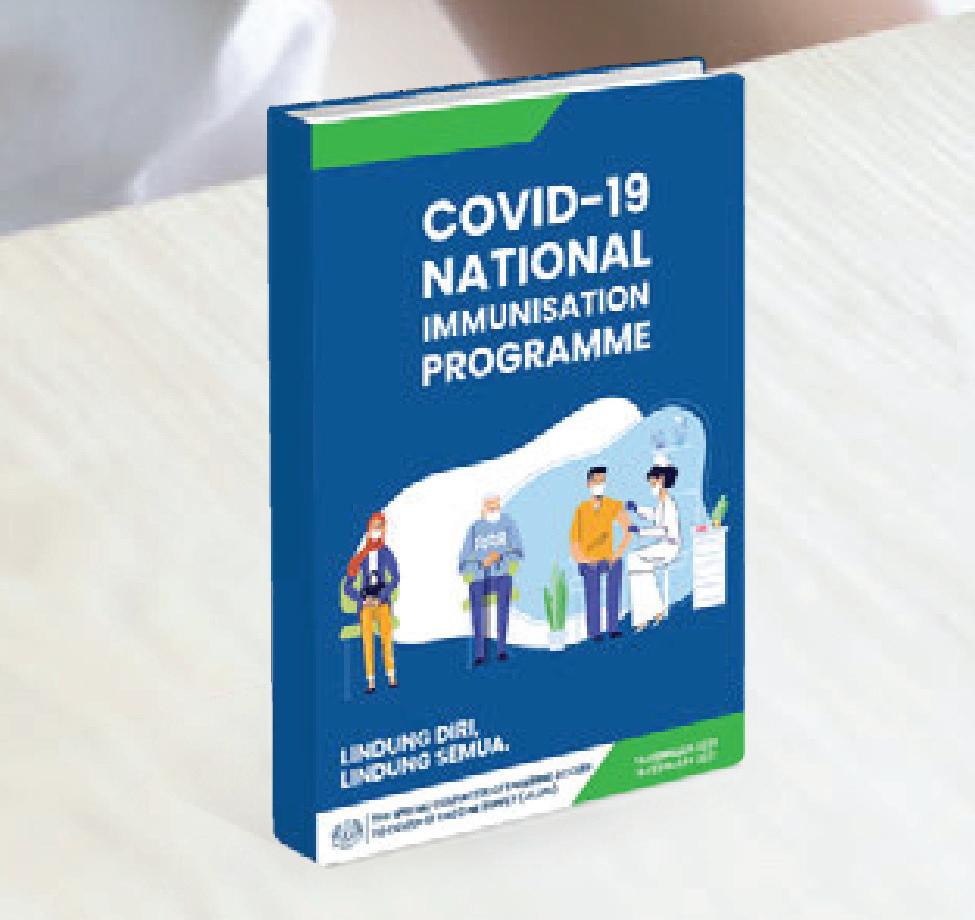

ASM has been working closely with MOSTI and MOH to ensure that the immunisation programme follows the most stringent scientific process with regards to the roll-out. ASM has published the National COVID-19 Immunisation Programme (NIP) handbook in collaboration with MOH and MOSTI, which was launched by the YAB Prime Minister in February 2021.
In the effort to expediate the vaccination roll-out, the Academy mooted the idea of drive-through vaccination centres after doing a benchmark analysis of global practices such as what’s being carried out at the Arizona State Farm Stadium in the United States. The ASM data scientists which consists of YSN-ASM members developed the plan for Malaysian drive-through vaccination centres, which been implemented throughout the country. The team also developed the SOP for the establishment of mobile and outreach vaccination centres in collaboration with National Heart Institute, MOH, MOSTI, Malaysian National Security Council, the Ministry of Defence, and other stakeholders nationwide.
ASM data scientist team assisted in with carrying out the modelling, forecasting the distribution of vaccines and projecting the target under the National COVID-19 Immunisation Programme (NIP). The two models that the team developed were the outdoor vaccine modelling; which focuses on the flow on vaccine exercises conducted outdoors, the estimation of daily completion, and estimation of completion of the program according to the targeted population. Besides that, the vaccine throughput modelling focuses on daily throughput KPI for each state based on vaccine supply record, target population, availability of vaccine administration centre and vaccination completion target. In addition to creating the two models, the team analysed the risk, R rate while also assisting CITF in the smooth administration of the throughout the NIP.
The Academy has also been tasked to chair the Establishment of Mobile, Drive-through and Outreach Committee VAC for CITF (COVID-19 Immunisation Task Force). The committee developed the SOP for Ventilation for COVID-19 and the SOP for setting up COVID-19 PPV at Places of Worship.

The of (CCOVID-19 Imm the SOP for V COVID-19 PP
Newton-Ungku Omar Fund (NUOF)
NUOF programmes develop research network among multi- and inter-disciplinary researchers through the integration of STIE knowledge by addressing the socio-economic issues in Malaysia and the UK. The execution of NUOF programmes has come to an end with the completion of 61 projects with only one terminated project.
To measure the impact of NUOF projects managed by ASM, a NUOF Impact Analysis Workshop was organised to collect the output and outcomes of NUOF projects from the recipients. Aside from showing a good degree of satisfaction among recipients, the collaboration with the UK researchers also give Malaysian researchers the exposure, advanced knowledge and technology through the trainings and reciprocal visit to UK’s institutions.
The collaboration between Malaysian and the UK Researchers through NUOF projects supports the capacity building of both countries’ researchers and benefits the research findings through patent filling. Collaborations also serve as the baseline to develop policies and enhance current research practices and technology processes.

7 7 62£5
Received allocation from 2015-2018 by ASM:
NUOF programmes managed by ASM completed NUOF projects billion by monetary and inkind support Malaysian-UK Government match fund until 2021

programmes
RM 18,166,236.68
Disbursed allocation including expenses from 2016-2021: NUOF projects under the

61(98.4%) (84%)
RM 15,563,152.14
Proposed figures on the overall NUOF programmes managed by ASM
Malaysia & UK’s Total contribution: £ 19.2 million (~RM105.05 million)
Total Malaysia-UK match fund for NUOF programmes managed by ASM: £ 5,503,422.90 (~RM30,268,825.95)
Since 2015, received allocation for the implementation of NUOF programes by ASM £ 3,368,799.33 (~RM18,166,236.68)
Mahathir Science Award (MSA) Evaluation & Selection Process 2021
The Mahathir Science Award (MSA) is the world’s most prestigious science award for tropical sciences, and bestowed on any scientists, institution or organization worldwide in recognition of their contributions and innovations towards solving problems in the tropics through science and technology.
As such, this extends beyond the boundaries of Malaysia in order to encourage excellence in tropical science that will accord direct benefits to countries in the tropics and indirectly to the global community in the fields of:
• Tropical Agriculture
• Tropical Architecture and Engineering
• Tropical Medicine
• Tropical Natural Resources
The 2021 MSA was open to Tropical Agriculture and Tropical Architecture and Engineering category. ASM has been entrusted by the MSAF to carry out the evaluation and selection process of the MSA since its establishment in 2005. The 2021 evaluation and selection process of the Winner was carried out from 15 March until 8 April 2021. No winner was selected for the 2021 MSA.

Infographic
15 nominations received in 2021
230 nominations received from 2015-2021
11 MSA Laureates were awarded from 2015-2021
15 nominations were received for evaluation and selection by ASM in 2021
SPECIAL PROJECT
























































































Malaysia Open Science Platform
Training of Trainers (Series I, II and III, PLANMalaysia, UNESCO)
The Training of Trainers Programme (ToT) equips future data stewards with applicable competencies, expertise, and skills in Open Science and Data Stewardship. Besides that, this programme also provides an upskilling opportunity for existing librarians, researchers, research managers and anyone in the research field. By the end of the training, MOSP aims to produce 200 trained data stewards from various research institutions, ministries, and universities in Malaysia. By the end of the training programme, MOSP have successfully trained 231 data stewards nationally.
MOSP has subscribed OpenLearning as a platform to conduct the training. There are two courses offered in this training, which are:
Registered participants must complete both courses to become a trained data steward.
56
106
Common Challenges:
• Commitment issues
o Participants often say that they have time constraints as they are working full-time job at their institutions while joining the training.
o MOSP Team addressed this by having catch-up session with the participants, accommodating their requests to have some extra few days to complete the training, and regular check-ups with their progress.
• Open Science and Data Stewardship are new topics
o It can be challenging to train people, especially the Data Stewardship Course because it can be quite technical. Also, this knowledge seems theoretical and distant to our research culture, so it is interesting to find ways to display real-world applications.
o This allows MOSP to discover several Open Science and Data Stewardship practices and projects that have been implemented in Malaysia and share it with the participants.
UNLOCKED Campaign
UNLOCKED is MOSP’s first campaign to create awareness. The monthly campaign started in September 2021, on the topic of Citizen Science. The campaign’s objective is to educate the public about Open Science components via social media. The campaign is held with notes and quizzes held fortnightly, which are released on the second and fourth week of the month on MOSP’s Facebook Page.
The winners of this campaign will be issued an e-certificate of participation and interesting prizes each month.
20.451 views
MOSP #openscience
View all245 comments
2 DAYS AGO
20.451 views
MOSP #openscience




View all245 comments
2 DAYS AGO
MOSP Example of notes posted for the campaign on the topic of Open Innovation (December 2021)Open Science Webinar
An Open Science Webinar was organised on 11 January 2021 to kickstart the year involving researchers, librarians and research managers from Malaysia Association of Research Managers and Administrators (MyRMA) and MOSP. MOSP initiatives and the global landscape of MOSP pilot initiatives, intergovernmental efforts towards promoting Open Science globally, and efforts towards developing policies and guidelines on Open Science in Malaysia were discussed.
• Moderator: Professor Dr Abrizah Abdullah, the Malaysia Open Science Alliance’s Head of Capacity Building and Awareness Working Group.
• Panellists:
o Academician Professor Emerita Tan Sri Dr Mazlan Othman FASc
o Professor Dr Noorsaadah Abd Rahman FASc
o Professor Datuk Dr Rohana Yusof

MOSP in the Media
A promotional video was produced and posted on ML Studio’s social media platforms such as YouTube, Twitter, and Instagram on 8 December 2021. This three-minute video has approximately 10,800 viewers on FB and 8,000 viewers on YouTube so far.
https://www.youtube.com/watch?v=AeywjOeESGU
https://mlstudios.my/2021/12/08/data-hasil-penyelidikan-universiti-disimpan-di-mana/
MOSP was featured on RTM’s Selamat Pagi Malaysia on 2 August 2021, where Professor Dr Noorsaadah Abd Rahman, Chairperson of Malaysia Open Science Alliance briefly described the MOSP pilot project and its benefits and impact to society. This media appearance has greatly helped MOSP build awareness, with a total viewership approaching 1.5 million.
Advancing Science in Southeast Asia
Web Conference 2021
On 25 October 2021, the Southeast Asia Network for Open Science (SEANOS) organised a web conference titled “Advancing Science in Southeast Asia Web Conference 2021”. The morning session carried the topic “How to Produce Research That Has Impact, Credibility, and Quality, as well as How to Utilise Existing Infrastructure in The Region”.
MOSP conducted a live discussion for Malaysia in the afternoon. This session was conducted in a forum format and was delivered in Bahasa Malaysia. The forum centred on how to overcome the problems as well as addressing current issues in doing research in Malaysia. Ideas and solutions compiled during the session were documented and submitted to SEANOS in January 2022 for them to use when drafting a policy.
Morning Session Representatives:
• Academician Professor Emerita Tan Sri Dr Mazlan Othman FASc
• Professor Emeritus Tan Sri Dr Zakri Abd Hamid FASc
• Puan Hazami Habib, ASM CEO
Afternoon session Moderator and panelists:
• Professor Ismanizan Ismail, a member of Malaysia Open Science Alliance
• Dr. Zainul Akmar Zakaria, Associate Professor, Department of Bioprocess and Polymer Engineering, Faculty of Chemical and Energy Engineering, Universiti Teknologi Malaysia.
• Prof Dr Kamisah Osman, Head of Science Education Module, Professor Centre of Innovation in Teaching & Learning, Universiti Kebangsaan Malaysia.
• Dr Siti Sarah Othman, YSN-ASM Member, Faculty of Biotechnology and Biomolecular Science, Universiti Putra Malaysia.
Malaysia Open Science Forum 2021
MOSP was approached by Wiley to collaborate for a forum on Open Science on 25 August 2021. This forum featured researchers and librarians to share about their perspectives and roles as well as their institutions involvement in Open Science. This programme provided an opportunity to learn how other library and faculty leaders are supporting researchers in their Open Science journey.
Malaysian Collaborative Network for Disruptive Innovation (i-Connect)
i-Connect facilitates Malaysian industries to leverage on science and technology to develop innovative homegrown products and solutions to pursue new economic opportunities in emerging global markets. The initiative does this while nurturing the growth of conducive innovations ecosystems based on collaborative networks.
Neutral Entities and Founding Members
Five Neutral Entities have been appointed to orchestrate the collaborative network for four sectors. Each Neutral Entity appointed Founding Members that represents the quadruple helix (industry, government, researchers, and civil society) to provide valuable strategic knowledge and leadership experience for the creation of demand-driven R&D projects to disrupt the incumbent markets.
i-Connect Projects
Based on the shared vision, strategic inputs and advice from the Founding Members, the Neutral Entities formulated a strategic plan for their sectors that comprised key focus areas, technology roadmap and problem statements. These problem statements were broadcasted to industry players and researchers in Malaysia in order to translate the gaps into projects.
This year, five projects have been endorsed by ASM with a total project cost of RM13.88 million with a contribution of RM7.31 million from the industry, which is more than 50% of the project’s total cost. ASM was appointed as the Implementing & Monitoring Agency under the Strategic Research Fund (SRF-APP).
Memorandum of Understanding (MoU) Signing Ceremony with Futurise Sdn Bhd (Futurise)
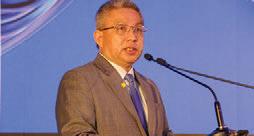
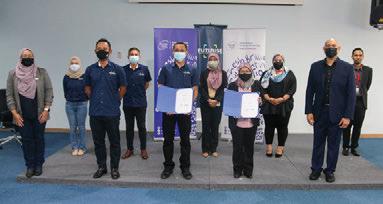
An MoU between ASM and Futurise was signed during a ceremony held on 9 April 2021. The MoU links ASM’s i-Connect with Futurise’s open innovation platform called Futurity. This platform shall be a stepping stone for i-Connect to digitalise the programme’s implementation.


Memorandum of Understanding (MoU) Signing Ceremony with Malaysian Global Innovation & Creativity Center (MaGIC)
An MoU between ASM i-Connect programme and MaGIC as the lead secretariat of National Technology and Innovation Sandbox (NTIS) initiative was signed. Besides facilitating project execution between each of these organisations, this MoU enables ASM members to be on the advisory panel for NTIS, while MaGIC’s representative can serve as Founding Members under any sector of i-Connect.

INFLUENCER






























































































































































































































































































































































































Bureau of International Affairs
ASM-AAAS-TWAS Regional Course on Science Diplomacy 2021
The COVID-19 pandemic is “a wake-up call” for science diplomats to address a range of issues in which science, technology, and the society are tightly intertwined. Timely and pressing issues informed and addressed by scientific expertise, such as the COVID-19 pandemic and climate change, illuminate the urge for nations to collaborate across boundaries.
ASM, the American Association for the Advancement of Science (AAAS) and The World Academy of Sciences (TWAS) recognised the significance of Science Diplomacy in these trying times. This workshop was the first of its kind held in the East and Southeast Asian region. This was a unique opportunity for ASM to partner with AAAS and TWAS, two leading organisations that specialised in teaching science diplomacy and training young scientists.
The course trained scientists and policymakers in science policy and fostered the necessary connections powered by science diplomacy to address key issues. It encompasses scientific evidence and understanding that informs policy, diplomatic efforts that work toward scientific collaboration among nations and the international relations fostered by scientific collaboration.
The three main aspects that were stressed throughout this course were:
(i) Science in Diplomacy
(ii) Diplomacy for Science
(iii)Science for Diplomacy
The course concluded that, to effectively convince policymakers of the significance of current issues, those engaged in science diplomacy must be credible, relevant, and legitimate. The course also encouraged its participants to get involved with their own country’s academy of science, with their country’s policymakers, as well as with their fellow alumni of science diplomacy courses.
• The Regional Course on Science Diplomacy was held from 16 to 19 March 2021.

• Although the course focused on science diplomacy in the Asia-Pacific region, it brought together 56 scientists and policymakers from 29 countries across Asia, Africa, and the Americas.
• 33 speakers and moderators facilitated the event from across multiple continents.
AASSAClimate Change and HealthProject
The relationship between climate change and health is complex, and it is imperative to understand these complexities to formulate policies that can mitigate the effects of climate change, especially in developing nations where the effects on health will be felt the most, owing to the vulnerable population groups in these countries. Evidently, there is a need to explore the topic to ensure that adequate and timely strategies are used to prevent and mitigate the effects of climate change on human health.
As part of the InterAcademy Partnership (IAP) Climate Change and Health (CCH) Project, The Association of Academies and Societies of Sciences in Asia (AASSA) has recently published the regional report on ‘The Imperative of Climate Action to Promote and Protect Health in Asia’. The AASSA Working Group on CCH was led by Academician Emeritus Professor Dato’ Dr Khairul Anuar Abdullah FASc, the President of AASSA. ASM led the AASSA’s Working Group on CCH to organise a series of regional workshops to clarify the regional focus areas and make a regional analysis for CCH. The workshops involved experts from 16 Asia and Oceania countries to formulate science-based recommendations.
The report touches on how climate change has affected the spatio-temporal, socio-economic, and political variations within Asia and Oceania. It recognises that geographical areas that lack technological advancement and development require a different set of criteria and approaches to assess the health and well-being of their citizens. Scientific evidence is essential for effective policymaking to prevent the health impacts of climate change. This report has summarised the policy suggestions and directions to adapt and mitigate, as well as to clarify current research gaps. These actions should accompany social transformation towards sustainable development.
The report has put forward some recommendations for five key sectors:
• Education and training
• Research and knowledge implementation
• Integrated healthcare facilities, services, and implementation
• Government support in policy development
• Financial aid and adequate resources
This regional report was also presented during the 26th United Nations Climate Change Conference (COP26). The IAP is currently publishing the Global Report titled “Health in the climate emergency – a global perspective” that comprises all input from four regional networks: AASSA (Asia), EASAC (Europe), IANAS (Americans) and NASAC (Africa). The global report is expected to be published in May 2022.
Executive summary:Full report:
2nd ASEAN Foresight Alliance Workshop
ASM collaborated with the National Academy of Science and Technology, Philippines (NAST PHL) to organise the 2nd ASEAN Foresight Alliance Workshop. The Workshop taught participants on the application of foresight methodologies as tools to design ASEAN common future goals and help build-up the capacity of ASEAN members in developing their national policies, strategies, and action plans.
This Workshop steered towards having an ASEAN Vision 2050, discussed the plans and activities of the ASEAN Members, and expanded the ASEAN Foresight Alliance network. The workshop brought together more than 60 scientists and policymakers to discuss their aspirations of ASEAN beyond 2025 predicated on STI capacity and competency. They also discussed on how ASEAN can be more agile in facing future challenges, as well as planning and coordination in terms of STI.
The Board of Advisors of AFA also convened for their second meeting on 9 June 2021. Members agreed to establish a cohort of permanent foresight researchers called the ASEAN Foresight Research Cohort. The Cohort will consist of two representatives from each ASEAN Member States (AMS) and driven by researchers that will assist AFA to conduct ASEAN Foresight 2035. The researchers will be doing research from their own AMS and the data will be collated in a depository as materials to prepare for the ASEAN Foresight 2035 report. The main goal is to present the ASEAN Foresight 2035 at the ASEAN Ministerial Meeting in 2024 to be formally adopted.

Participants:

• The workshop was attended by a total of 150 participants.
Workshop
• 2nd ASEAN Foresight Alliance Workshop from 7 to 9 June 2021. Prior to this Workshop, ASM and NAST organised a training workshop on 24 May 2021.
ASM-PALAST Virtual MoU Signing Ceremony


ASM has opened another chapter in its effort to establish international partnerships by signing a Memorandum of Understanding(MoU) for Scientific Collaboration in Research with the Palestine Academy for Science and Technology (PALAST) virtually on 6 October 2021.

The MoU was signed by ASM President Professor Emerita Datuk Dr Asma Ismail FASc and the President of PALAST cum Palestine’s Minister of Education, H.E. Minister Professor Marwan Awartani.
The objective of the MoU is to foster collaboration in the fields of science, research, and education between Malaysia and Palestine. A Palestinian-Malaysian Science Bridge program was proposed to build capacity and transfer knowledge in the fields of S&T research and education. This partnership is in line with MOSTI’s objectives to expand Malaysian capabilities in STI by forging partnership with reputable international institutions. This synergistic partnership helps to advance knowledge to deal with local issues by introducing internationally merged solutions.
The Science Bridge will close the scientific and technological cooperation gap between the two academies. Such “bridges” will also provide valuable opportunities for researchers at Malaysian universities, research centres and government agencies to engage in collaborative research with their counterparts in international partner institutions.
International Science, Technology and Innovation Centre South-South Cooperation (ISTIC)
Inspired by the 2005 Doha Plan of Action and adopted during the Second South Summit of the Group of 77 and China in Qatar, ISTIC was launched in May 2008, as an international platform for South-South cooperation in science, technology and innovation. ISTIC has come a long way since then. For more than a decade, it has left a big footprint.
The year 2021 was a very important year for ISTIC, one in which the organization prepared itself for the next major step in its journey. The Centre completed its independent review and focused on the renewal process of its Agreement.
ISTIC also finalised the strategy that will guide it into the next phase of its establishment in 2021. This Strategic Plan sets out a vision for ISTIC’s evolution over the next six years, responding to a changing development landscape and the evolving needs of its partners. It builds on the lessons learned from its past evaluation and charts new routes forward for ISTIC, while also building on existing strength. This plan reinforces its commitment to working with Governments, civil society, and the private sectors as a catalyst and facilitator of support as mandated by the Malaysian Government and UNESCO. It will walk on a new path built on a strong legacy to achieve its aims, realise its ambitions and aspirations, and ensure the sustained success of this leading international organisation.
International Science Council Regional Office for Asia and the Pacific (ISC ROAP)
The International Science Council - Regional Office for Asia and the Pacific (ISC-ROAP) promotes the development of science throughout Asia and the Pacific. The organisation helps strengthen the voice of scientist from the developing countries in this region, and increased the value of science and evidence-based decision making.
This Regional Office was inaugurated on 19 September 2006 and hosted by Malaysian Government since then. The hosting of the regional office is based on five-year agreement between Malaysian Government and ISC headquarters in Paris. Funding for ISC ROAP is supported by Malaysian Government and ISC. The term for Malaysia to host ISC-ROAP ended in 2021 after 15 years hosting it.
This year, ISC-ROAP together with ASM and the Mahathir Science Award Foundation (MSAF) organised a number of programmes. Among the highlights are:
1. Disaster Risk Reduction (DRR) Session at Sustainability Research and Innovation Congress 2021 (SRI2021)
On 14 June 2021, the IRDR ICoE Taipei convened a panel at the Sustainability Research & Innovation Congress 2021 (SRI2021). Participants came together in a forum entitled “To Distill from Experiences of Stakeholders, Scalable Strategies for Disaster Risk Reduction and Societal Resilience Building”. The forum served as a platform for the participants to share their knowledge and best practices.
2. International Day of Forest
On 23 March 2021, ISC-ROAP, MSAF and ASM partnered with the Jeffrey Sachs Center on Sustainable Development at Sunway University to jointly organise a webinar themed “Tropical Forests Under Threat: Finding Our Way Out of the Woods” in conjunction with the International Day of Forests. Webinar attendees came from 18 different countries and indicated that they liked the multi-pronged approach of the webinar towards forest restoration and preservation, which covered community involvement, green finance and agroforestry.
3. World Health Day
The Webinar was organised together with MSAF and ASM in conjunction with World Health Day. The Webinar themed “Towards a Fairer and Healthier Tropics” was organised on 7 April 2021. The moderator summarised that at the local level, tropical nations have the capacity to lead their own change. Meanwhile, at the global level, health policy reforms require us to recognise that health and equity is a political, scientific, and ethical choice that can be achieved by a coalition of the willing, the able and the relevant. Overall, the webinar was a success in bringing people from 25 countries in the interest of a fairer and healthier tropics.
4. World Ocean Day
In conjunction with World Ocean Day, ISC-ROAP, MSAF and ASM co-organised a webinar that addressed “Ocean Life and Livelihoods in The Tropics”. This year’s World Ocean Day sheds light on the wonders of the ocean and how it is our life source, supporting humanity and every other organism on earth. Some of the key points raised in the discussion were the vulnerability and resiliency of coastal communities in response to climate change, municipal fisheries and aquaculture development for sustainable marine resource management. The panellists also underscored the importance of generating collective impact at all levels by establishing an effective national ocean policy and governance for the tropical ocean. Towards that effort, the UN Ocean Decade could be used as an action framework consisting of transdisciplinary priority areas relating to the ocean for the Tropics.
5. International Day of Biodiversity – Naming Nature 2 Naming Nature 2 was held on 21 May 2021 via Zoom in conjunction with the International Day of Biodiversity. The webinar was jointly organised by ASM, MSAF and ISC. Two hundred and eighty people from 12 countries (Australia, Bangladesh, Denmark, France, Indonesia, Malaysia, Netherlands, Philippines, Singapore, Spain, UK, USA) had registered for the webinar.
Malaysia through ASM will continue become the member of ISC to participate in important scientific conversations and activities, to showcase national scientific contributions at the international level, and to connect to each other and to influential networks worldwide.
Communicating Science
The Marketing Communication, Creative Production and Design Unit of ASM as well as ASM Press work hand-in-hand with ASM’s top management and Expert Network to enhance the organisation’s visibility of its initiatives and studies. These teams play a crucial role in the enculturation of science and strengthening corporate identity through the curation and dissemination of STIE topics.
Ultimately, these efforts are made visible among ASM’s stakeholders to build strong and meaningful relationships with them. Conventional and new media are the chosen platforms on which ASM performs its communication endeavours, and we strive to expand our avenues via novel media.










SOCIAL MEDIA
(2020-2021)
21,140
28,672
9,340
4,563
4,907
48,599
TOTAL FOLLOWERS










































































































































































OUR EXPERTS
























































ASM’s greatest asset is its people. The convergence of expertise, knowledge and wisdom of the Fellows from various disciplinary groups allows ASM to provide solutions to many problems that is faced by the nation. Besides Fellows, the recipients of Top Research Scientists Malaysia (TRSM), members of Young Scientists Network (YSN-ASM), ASM Associates and the Mahathir Science Award Laureates actively work with ASM. These various groups of experts form the ASM Expert Network.
Apart from taking part in working committees and projects, the ASM Expert Network often represents ASM at ministerial level meetings and symposiums. They are also referred for their technical expertise by ASM, ministries and government agencies, and media.
Every year, the Academy organises programmes to engage ASM Expert Network and harnesses their input through dialogues and intellectual discourse. Following are the programmes organised in 2021:
1 General Assembly 1 IdeaXchange
2 FAScinate session
Humanising the Economy through 5Ps of SDGs for Greater Impact
Malaysia performed reasonably well in reaching the sustainable development goals (SDGs) in 2020, having recorded positive achievements in 49 indicators (34%). Regrettably, the COVID-19 pandemic became ferocious in 2021. Not only had it robbed us of lives and livelihoods, but it also threw us off the track in the pursuit of sustainability of development. ASM President Professor Emerita Datuk Dr Asma Ismail FASc called for a reassessment of where we are, and to strategise recovery plans so Malaysia can get back on track on achieving the 17 SDGs, which could contribute to the Malaysian economy and societal wellbeing.
The 13th ASM General Assembly was held online on 9 September 2021 to discuss how the five core elements of SDGs (5Ps) i.e. People, Planet, Prosperity, Peace and Partnership contribute to societal wellbeing and economic growth. The pandemic has highlighted the significance of a humanised economy by implementing the essence of 5Ps.
The panellists:
• Academician Emeritus Professor Tan Sri Dato’ Sri Zakri Abdul Hamid FASc (moderator)
• Professor Datuk Dr Denison Jayasooria (Secretariat Head of APPGM SDG)
• Ms Lavanya Rama Iyer (Head of Policy & Climate Change WWF)
• Distinguished Professor Dato’ Dr Rajah Rasiah FASc (University of Malaya)
• Ms Tan Mei Ling (World Bank Senior Country Operation Officer)
The panellists concluded that the 5Ps are a good basis to create future action plans for the country. The President of ASM concurred and pointed out that ASM has been a trusted entity among the quadruple helix that takes different perspectives from various stakeholders into account when composing policy papers.
Building a Resilient Nation: STI as the Enabler of the 12th Malaysia Plan
The much-awaited Twelfth Malaysia Plan (12th MP) has captured extra attention among its rakyat as the nation slowly recovers from COVID-19. It is imperative to understand, appreciate and support the 12th MP to transform Malaysia into a prosperous, inclusive, and sustainable country. Can the Twelfth Malaysia Plan be the ultimate game changer? The 35th IdeaXchange was organised virtually to provide insights from 12th MP specialists on 25 October 2021.
MOSTI Minister YB Dato’ Sri Dr Adham Baba emphasised the significance of STIE for effective COVID-19 pandemic recovery in his speech. Synergy among the quadruple helix is key for achieving success. The Minister also urged researchers to foster the WOW characteristics: World class pacesetting, Outstanding opportunitycreating and being Winnable, transformative, and impactful.
The IdeaXchange concluded that the 12th MP would not attain success only by single-handedly involving the quadruple helix. Instead, the 10-10 MySTIE framework that focuses on various niche areas should also be applied.
• Moderator: Ts Professor Dato’ Dr Ahmad Ibrahim FASc
• Presenter: Dato’ V Valluvan Veloo, Director of Manufacturing Industry, S&T Division from EPU
Open Minds, Spark Ideas
Two sessions of FAScinate were held this year featuring eight speakers. The topics presented were diverse, ranging from physical and social sciences, green technology, medical sciences as well as science education.
Indigenous Communities and COVID-19: Response and Resilience
Dato’ Dr Madeline Berma FASc




Earthquakes: Is Malaysia at Risk?
Professor Ir Dr Azlan Adnan FASc


Universiti Teknologi Malaysia
Will Destroy Our Oil Palm Industry?
Professor Ts Dr Chong Khim

Phin
Universiti Malaysia Sabah
Supercapattery : A Salvation For Sustainable Smart Cities
Professor Dr Ramesh T

Subramaniam FASc
Universiti Malaya
Medicinal Benefits of Maslinic Acid
Professor Ts Dr Lim Yang
Mooi
Nature; The Fascinating Chemical Factory
Professor Dr Nor Hadiani Ismail

FASc
Green and Sustainable Innovations through Process
Intensification
Professor Ir Dr Suzana Yusup
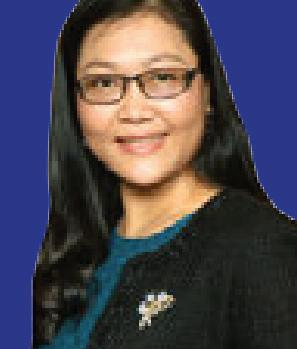

FASc
Engaging, Inspiring and Transforming the Learners of Tomorrow
Dr Manraj Singh Cheema

10,948 views on Facebook live Watch
21Speakers to date
ASM Chapters
P PERAK
KELANTAN TERENNGGANU
SOUTH CHINA SEA
The ASM Chapters were set up to provide a platform for the ASM Expert Network to get together and organise programmes in their region. The Chapters bring together ASM Fellows, TRSM recipients, members of YSNASM and ASM Associates in the region to carry out activities aligned with the ASM functions. By concentrating their expertise and resources, the Chapters could hold more specific programmes in the region, getting a wider reach among the local scientific community and consequently increasing ASM’s visibility in the region.
The Northern Chapter was the first chapter established in 2011, followed by the Southern Chapter in 2016. Three additional Chapters were being set up last year - the East Coast Chapter, the Sabah Chapter and the Sarawak Chapter. In 2021, the main activities held by the Chapters were webinars, conferences, competitions, technical projects and proposals for studies. Some of the activities also involved collaboration with other stakeholders such as UniMas, UTM, USM and UMP.
SELANGOR R
TERENGGANU NEGERI N SEMBILAN N
MALACCA JOHOR
In Memoriam
Tun Ahmad Sarji Abdul Hamid
Elected as Honorary Fellow in 2009
Ahmad Sarji was appointed to lead several government agencies, including the Director-General of the Farmers Organisation Authority (1973-1979) and Majlis Amanah Rakyat (MARA) in 1981 and then Deputy Director-General of the Public Service Department (JPA) in 1981 to 1985.

Ahmad Sarji was later appointed Secretary-General of the Ministry of Trade and Industry in 1985 until 31 January 1990. His career in the civil service was at its peak when he was appointed Chief Secretary to the Government from 1 February 1990 until his retirement in 1993. His service as the Chief Secretary to the Government was extended on a contract basis until 15 September 1996.
(16 September 1938 – 28 August 2021)
Tun Ahmad Sarji Abdul Hamid was born in Tapah, Perak on 16 September 1938. He obtained education at Government English School in Tapah and studied up to Master’s degree at Harvard University, the USA, in Public Administration.
His first career began in public administration by joining the Malayan Administrative Service as the Deputy Assistant District Officer of Klang, Selangor, on 10 January 1961. He served as a Rembau District Officer in 1963. In 1964, he was appointed as Port Dickson District Officer, which he served until 1967.
In 1968, Ahmad Sarji was appointed as Assistant Director (Service) of the Public Service Department before being appointed Secretary (Cabinet Division) of the Prime Minister’s Department in 1972. After that,
Tun Ahmad Sarji held several important positions in leading Government-linked companies. Among them were Petronas Board Member (1985-1990), Permodalan Nasional Berhad (PNB) Board Member (1985), Chairman of the Malaysian Institute of Standards and Industrial Research (SIRIM) (1992), and Chairman of Sime Darby Bhd (1998). He also served as the first chairman of the Institut Kefahaman Islam Malaysia (IKIM) in 1992, Pro-Chancellor at Universiti Tun Abdul Razak (UNITAR) in 2003 and Universiti Kebangsaan Malaysia (UKM) in 2006, as well as Chancellor of Universiti Tun Abdul Razak (UNIRAZAK) in 2012. He also contributed as the first Chairman of the Mahathir Science Award Foundation (2010-2013). In 2012, headed the Malaysian Contingent to the Olympic Games in London.
He received various awards, including Tokoh Maal Hijrah 1420 Hijrah, Sports Leadership Award by the National Sports Awards, Tun Sri Lanang National Book Figure Premier Award, 2012 Gold Medal of Honor by the Royal Rotary Club of Kuala Lumpur, Queen Victoria Memorial Medal by the European Business Assembly. He was also named as a Sports Icon for National Sports Award 2015. He was awarded the Seri Setia Mahkota Malaysia (SSN), which carries the title of Tun, in June 2008.
Tun Ahmad Sarji passed away at the age of 82, but his legacy as the most respected and revered public service figure remains in the country.
Professor Dr Hamdani Saidi
Elected as Fellow in 2013 under the Engineering Sciences Discipline
Professor Dr Hamdani was one of the pioneers in the R&D of membrane technology in Malaysia. In 1990, he initiated the establishment of the Membrane Research Unit (MRU) in UTM, currently known as the Advanced Membrane Technology Research Centre (AMTEC). Through this research centre, he started the development of membranes and their applications in the process industry. To date, AMTEC is recognised globally as a reference centre attracting significant researchers from Government and industry, developing expertise and products, and contributing new knowledge.
In pursuit of knowledge and innovation, he led a team of experts to develop fuel cell technology, a clean and efficient power generation system for stationary and mobile applications. The Government fully funded the program under the prioritised research project. He also pioneered the development work on the implementation of plasma technology for waste-toenergy conversion in Malaysia. His research findings were widely published in many international journals, namely Journal of Power Sources, Advanced material, Mathematical Modeling, Journal of Applied Polymer Science, Journal of New Material for Electrochemical Systems and Polymer International.
(16 September 1938 – 28 August 2021)
Professor Dr Hamdani Saidi FASc was born in Selangor. He completed his secondary education at Sekolah Alam Shah, Kuala Lumpur, in 1970 before joining the College of Agriculture, Serdang, in 1971. He then continued his tertiary education at Louisiana State University, USA, until 1980 and received his Bachelor’s and Master’s degree in Chemical Engineering. In 1988, he obtained his PhD in Chemical Engineering at the University of Bradford, United Kingdom.
Professor Dr Hamdani started his first career as an Assistant Lecturer at Universiti Teknologi Malaysia (UTM) in 1977. A few years later, he was appointed as the Head of the Petroleum Engineering Department and then Deputy Dean in 1989. He was then promoted to Professor and Dean, Faculty of Chemical and Natural Resources Engineering until 1997.
Professor Dr Hamdani actively contributed his expertise and experience to the industry, Government and international organisations. He served as a technical consultant to the Malaysia Energy Centre (PTM) and was involved in the planning and implementation of Energy R&D. At the international level, he was appointed as a member of the Council of Energy Advisor of Gerson Lehrman Group, USA. The Council is a leading group of power and energy professionals that provides independent research in the power and energy sector to the investment community by working directly with industry professionals.
Professor Dr Hamdani is seen as a passionate scientist in the field of membrane technology. He will always be remembered by all.

Academician Dr C. Devendra FASc

with 80 projects in animal production systems in 13 Asian countries, targeted at encouraging efficient use of natural resources and the development of environmentally sustainable agriculture.
From 1993 to 1994, he worked as an independent consultant, undertaking work for the International Livestock Research Institute. Assignments took him around the world, from Latin America to North Africa. In 1995 as a Senior Associate with the Institute of Livestock Research, he managed projects in Asia. In 1999 he was appointed as a Team Leader for the Institute’s Crop-Animal Systems Research Network project involving five Asia countries, including China.
This work, funded through the Asian Development Bank, aimed to increase the productivity of croplivestock systems. Dr Devendra has contributed to the establishment, management, monitoring, and evaluation of crop and animal production projects and the use of natural feed resources in almost 20 different countries.
(21 Aug 1926 - 17 June 2021)
Academician Dr C. Devendra FASc was exemplary in animal science, locally and internationally. He was an international tropical animal production specialist with experience spanning over thirty years in research and development initiatives. His specialisation was in animal nutrition and animal production systems, central to integrated natural resource management and agricultural systems. He obtained a Bachelor of Agriculture Science degree in New Zealand, a Master of Agriculture Science in Malaysia, and his PhD from the University of Nottingham in the United Kingdom.
From 1971 until 1984, he served at the Malaysian Agricultural Research and Development Institute. He worked on fundamental and applied animal nutrition projects with goats and sheep and attained the rank of Principal Research Officer. In Singapore, from 1985 to 1992, he worked with the International Development Research Centre as Programme Officer in Animal Production Systems. During this time, he was involved
He also served at the University of the West Indies in Trinidad, MARDI in Malaysia, and the Animal Production Systems Asia programme with Canada’s International Development Research Centre (IDRC).
He was a member of the Strategic Planning Task Force of the International Livestock Research Institute (ILRI) in Nairobi, Kenya, and subsequently was appointed as a Senior Associate. He was a consultant to the World Bank, Asian Development Bank (ADB), United Nations Development Programme (UNDP), Food and Agriculture Organization (FAO), International Atomic Energy Agency (IAEA), United States Agency for International Development (USAID), Commonwealth Secretariat and several governments.
He was a Distinguished Visiting Professor at the University of Delaware, USA, and has also been an external examiner to the Universities of Queensland, Australia, and Uppsala, Sweden, and the University of Life Sciences in Ås, Norway.
Academician Dr C. Devendra FASc passed away on 17 June 2021. He will be remembered as a reputed icon in Animal Science.
Elected as Fellow in 2006 under the Biological, Agricultural and Environmental SciencesProfessor Dr Lim Yau Yan FASc
Professor Dr Lim Yau Yan FASc was born in Kuala Lumpur on 9 March 1943. He obtained a Bachelor of Science with honours from the University of Malaya in 1966 and a Doctor of Philosophy from the University Illinois, Urbana in 1971.
Professor Dr Lim was known as a leading expert in physical inorganic chemistry and specific areas of food chemistry. His research interests were diverse, from micellar catalysis based on surface-active transition metal complexes, the identification and bioactivity of active compounds from herbal plants, and the effects of processing treatment on the bioactivity of herbal plants.
He served as a chemistry lecturer for more than 40 years and produced many eminent chemists for the nation. He has published and delivered lectures extensively in physical inorganic chemistry. He has authored more than 80 refereed journal papers. Being an expert, he reviewed many chemistry and food science journals and evaluated research grants nationally and internationally. His achievements were in research on surface-active complexes and solution chemistry.
(9 March 1943 - 26 August 2021)
He was an active member in his professional and social activities. He contributed as an Associate of the American Chemical Society and a member of the Malaysian Institute of Chemistry. He served as an organising committee member of the Malaysian Applied Biology Symposium, the MONASH University of Malaysia in 2001 and an organising committee member of the 12th Asian Chemical Congress in 2007.

As an academic, Professor Lim Yau Yan has taught inorganic chemistry, medicinal chemistry, analytical chemistry and spectroscopy. He has supervised PhD students with exceptional and unique supervision practices. He received a commendation for Excellence in Postgraduate Supervision from the Science Faculty, MONASH University, Clayton, Australia, in 2014.
Professor Dr Lim Yau Yan FASc passed away on 26 August 2021. He is seen as a successful Malaysian Chemistry educator and will be remembered by everyone.
Elected as Fellow in 2015 under the Chemical Sciences DisciplineAcademician Professor
Emeritus Dato’ Dr Khalid Yusoff FASc
Elected as Fellow in 2002 under the Medical and Health Sciences Discipline
training in medicine, he began to teach and cultivate the practice and scientific investigation of his speciality. He initiated The Institute for Medical Molecular Biotechnology (IMMB) and the Centre for Translational Research and Epidemiology (The CenTRE), which quickly became a substantial research centre in Malaysia. He moulded strategic international partnerships linking UiTM’s medical faculty to a wide range of global universities and research institutes (including developing formal partnerships with the University of Melbourne and Bio21). These initiatives appreciably expanded the Malaysian medical workforce and national medical research.
He has been the Vice-Chancellor and President of USCI University, Malaysia, since 2013. Under his leadership, USCI has achieved various academic recognitions. The most notable one was that USCI University was ranked as the nation’s best private university two years in a row from 2019 to 2020, according to QS World University Rankings. As a leader, he also bought up UCSI to the world stage when he successfully created a strategic collaboration with prestigious universities, including Harvard University, to strengthen the medical students with the opportunity to pursue research programs with high impact.

(30 January 1955 – 5 April 2021)
Academician Professor Emeritus Dato’ Dr Khalid Yusoff FASc was the UK trained cardiologist who spent three decades promoting excellence in medical research in Malaysia, leading positions in three Malaysia’s leading universities and being a trusted adviser to the Government.
He was trained as a cardiology expert and started his medical career in the late 1970s as a student at the University of Melbourne, Australia, before conducting his training at the University of Newcastle-upon-Tyne, United Kingdom. Upon returning to Malaysia after his
His most remarkable list of national and international recognitions were in particular, the top academic awards from both UKM (2002) and UiTM (2011), the Lifetime Achievement Award from the Malaysian Society of Hypertension (2013), the Royal College of Physicians of London (1995) research award, the Hewlett Packard International Award (1998), the Albert Schweitzer Gold Medal (2001) and the Royal Awards from the Sultan of Kelantan (1999 & 2000). In 2019, he was appointed as a Senior Fellow of ASM for his contribution to the field of cardiology through practice, teaching and research, as well as championing research integrity in Malaysia. His motto throughout his leadership at USCI University was “Go Beyond; Be profound: Make a difference”.
Datuk Dr Hussein Awang FASc
Appointed on Foundation Fellow, Elected as Fellow in 1995 under the Medical and Health Sciences
In 1974, he was one of the founding members of the Malaysian Urological Association (MUA) and was later appointed as the president leading the association. This establishment represents a significant milestone in the development of Urology in Malaysia. As cadaveric transplantation was prohibited due to religious restrictions, he switched to performing transplants from a live related donor. In 1975, he marked history as the first surgeon in Malaysia to perform a renal transplant. After this success, he did a total of 75 transplants at GHKL. He held many offices, including representing Malaysia on the Asian Association of Surgeons Council.

(10 April 1940 - 18 April 2021)
Datuk Dr Hussein Awang FASc attended boarding school for his secondary education at Melbourne Grammar School. Following that, Datuk Dr Hussein entered Melbourne Medical School and graduated with MBBS in 1965. Then, he returned to Malaysia, where he got married and commenced resident years at the General Hospital in Singapore and later in Johor Bahru. In Singapore, he was trained in general surgery and was awarded the Fellow of the Royal Australasian College of Surgeons (FRACS). He then moved to the General Hospital Kuala Lumpur (GHKL) for urological training under Dr G. Sreenevasan. He rapidly acquired exceptional clinical and technical skills due to dealing with many cases involving advanced pathology, such as staghorn renal calculi and neglected tumours.
In the 1980s, Datuk Dr Hussein has seen the sprouting of private healthcare services. He and his two colleagues were inspired to fill a growing need for private healthcare and relieve the pressure on public hospitals. With the investment by the Johor Corporation (JCorp) and others, Tawakkal Specialist Centre, a 66bed private specialist hospital run by doctors, was built opposite GHKL. The name “tawakkal” was derived from his grandfather’s house in Johor Bharu and a family clinic in the same state, which means “trust in God” in Arabic. The then Prime Minister, Tun Dr Mahathir Mohamad, graced the official opening of Tawakkal in 1983. It grew through several extensions and was rebuilt to a hospital that accommodates 200 beds with most senior specialists from GHKL.
Datuk Dr Hussein remained the dominant influence and ensured that patient respect and care came first and that charity was appropriate in situations of financial difficulty. As a result of this success, the investor JCorp has developed a network of 28 hospitals with 3000 beds in Malaysia, Indonesia, Thailand and Bangladesh. Tawakkal hospital is now known as KPJ Healthcare.
In his closing years, Datuk Dr Hussein’s vitality started to fade. However, his legacy as the country’s most outstanding urologist remains, and he will be dearly missed.
FINANCIAL STATEMENTS
















































































































































































FINANCIAL OVERVIEW & ANALYSIS
The financial statements of the ASM and its reports are prepared in accordance with the Academy of Sciences Malaysia Act (ACT 524) and the Malaysian Public Sector Accounting Standards (MPSAS). This report aims to describe the financial position of ASM as well as a summary of financial transactions for the year ended 31 December 2021.
The financial statements for the year ended 31 December 2021 were submitted to the Auditor General on 11 March 2022 and the Auditor General certified and issued the certificate on 23 May 2022. During the financial year ended 31 December 2021, ASM recorded a profit after tax of RM739,193 million compared to with a profit of RM631,186 million in 2020.
TOTAL ASSETS
Fixed Deposits














RM20,560,233
Cash & Balance at Bank
RM4,434,415
Property, Plant & Equipment
RM2,600,422
Other Assets
RM296, 450
RM27,891,520
Operating Grants
RM11,143,683



Amortisation of Deferred Grant







RM6,094,116
TOTAL REVENUE











Current & Fixed Deposit Interest














RM437,066
Other Income

















RM1,283,176
RM18,958,041.00
































































Statement of Financial Position





































































































Assets
Cash and Bank Balance







The cash balance for the year ended 31 December 2021 was RM4.43 million as compared to RM0.68 million recorded for the year ended 31 December 2020. The cash balance increases more than 100% due to the receiving grants for Malaysian Collaborative Network (i-Connect) and Malaysia Open Science Platform (MOSP) amounting RM3.87 million in December.
Fixed Deposits






















































Fixed Deposits in ASM are made over period of 12 months or less depending on ASM’s immediate cash requirements and the interest rates offered by the financial institution. In the year ended 31 December 2021, fixed deposits amounted to RM20.56 million compared to RM20.38 million in the year ended 31 December 2020. The increase is due to the increase in cash requirement in 2021.
Table 1 shows the position of Cash and Fixed Deposit balances for 2021 and 2020.
Receivables for Exchange Transactions
Accounts Receivables shows the balance of money due to ASM for goods or services delivered at the end of the financial year. For year ended 2021, the receivables have increased from RM0.08 million in FY2020 to RM0.23 million in FY2021. Please refer to Notes 5 & 6 of the Notes to the Financial Statements for further details.
Liabilities




Current Liabilities
Total Current Liabilities for the year ended 31 December 2021 amounting to RM2.59 million shows an increase of 3.0% as compared to the RM2.53 million for year ended 31 December 2020. This is due to an increase in the tax provision for the current year.
CURRENT LIABILITIES

























































































Non-Current Liabilities
Total Non-Current Liabilities recorded an increase of 25.0% for the year ended 31 December 2021. The changes were due to the increase in Deferred Grants for Malaysian Collaborative Network (i-Connect) and Malaysia Open Science Platform (MOSP) projects compared to the previous year.
NON-CURRENT LIABILITIES
Table 2 shows the position of Current Liabilities balances for 2021 and 2020 Table 3 shows the position of Non Current Liabilities balances for 2021 and 2020.Statement of Financial Performance Income
Income consists of Non-Exchange Transactions and Exchange Transactions. Non-Exchange Transactions include operating grants, program grants, office rental charges etc. while Exchange Transactions include program management charges, fixed deposit interest and other income. Total income increased by 5.0% compared to prior year. This increase is due to operating grant and program grant amounting RM11.15 million.
Table 4 shows the Income for 2021 and 2020.
Chart 5 shows the Total Operating Grants received for the years 2017 to 2021.
Budget Performance
In FY2021, the Ministry of Science, Technology and Innovation (MOSTI) has allocated a total of RM10.74 million for the ASM Operating Grant including an additional one-off allocation for the maintenance of the ASM building amounting to RM0.61 million. The operating grants in FY2021 has increased by 31.0% compared to RM8.16 million operating grants received by ASM in FY2020. The additional allocation given is for the maintenance costs of the ASM office at Matrade building and Jalan Tun Ismail for piping works, wiring, air conditioning as well as air ventilation.
ASM’s Operating Expenditure for FY2021 amounted to RM10.69 million. Operating Expenses consist of payment of salaries and wages, services and supplies, fixed assets, grants and fixed charges as well as other expenses.
Table 5 shows a summary of the budget performance of the ASM in FY2021.
Chart 6 shows Total Income and Expenditure for 2017 to 2021. TOTAL INCOME AND EXPENSES
Expenses
Services and Supplies
Expenditure for Services and Supplies consists of administrative management expenses, contract staff expenses, science communications and membership affairs. The total services and supplies expenses for FY2021 increase by 30.0% mainly due to office renovation, piping works, wiring, and roof replacement at ASM Jalan Tun Ismail amounting to RM1.05 million.
Table 6 shows the Services and Supplies for 2021 and 2020
SERVICES AND SUPPLIES
Science Programme Expenses
The total science programme expenses for the year ended 31 December 2021 amounting to RM7.14 million shows a decrease of 18.0% compared to prior year (FY2020: RM8.70 million). This is due to decrease in deferred grant expenditure for the Malaysian Collaborative Network (i-Connect) and Newton-Ungku Omar Fund (NUOF) projects.
Table 7 shows the Science Program Expenses for 2021 and 2020.
Summary of Financial Performance
Table 8 shows the summary of financial performance for years 2017 to 2021:
















academy of sciences malaysia
TELL ME MORE


Management CommitteesWEHAB++ Committees
Council
Chair: President, Emeritus Professor Datuk Dr Asma Ismail FASc
Executive Committee (EXCO)
Chair: President, Emeritus Professor Datuk Dr
Asma Ismail FASc
Finance & Investment Committee
Chair: Honorary Treasurer, Professor Datin Paduka
Setia Dato’ Dr Aini Ideris FASc
Audit Committee
Chair: Datuk Dr Abdul Razak Mohd Ali FASc
Membership Committee
Chair: Vice-President, Professor Dato’ Ir Dr A.
Bakar Jaafar FASc
Media Response and Public Domain Focal Group
Chair: Secretary-General, Datuk Professor Dr Awg
Bulgiba Awg Mahmud FASc
Presidential Advisory Committee
Chair: President, Emeritus Professor Datuk Dr
Asma Ismail FASc
International Affairs
Chair: President, Emeritus Professor Datuk Dr
Asma Ismail FASc
Science, Technology and Innovation Policy Advisory Committee (STIPAC)
Chair: President, Emeritus Professor Datuk Dr Asma Ismail FASc
Publication Committee
Chair: Secretary-General, Datuk Professor Dr Awg
Bulgiba Awg Mahmud FASc
Senior Fellows Committee
Chair: Academician Emeritus Professor Dato’ Dr
V.G. Kumar Das FASc
Disciplinary Committee for the Top Management Group
Chair: Secretary-General, Datuk Professor Dr Awg
Bulgiba Awg Mahmud FASc
Disciplinary Appeal Committee for the Top Management Group
Chair: Vice-President, Professor Dato’ Ir Dr A.
Bakar Jaafar FASc
Water Committee
Chair: Dr Ir Salmah Zakaria FASc
Advisor: Academician Tan Sri Dato’ Ir Shahrizaila
Abdullah FASc
Energy Committee
Chair: Professor Ir Ts Dr Zainuddin Abd Manan FASc
Advisor: Academician Tan Sri Dato’ Ir Ts Ahmad
Zaidee Laidin FASc
Health Committee
Chair: Professor Dr Tunku Kamarul Zaman Tunku
Zainol Abidin FASc
Advisor: Academician Distinguished Professor
Datuk Dr Looi Lai Meng FASc
Agriculture Committee
Chair: Professor Dato’ Dr Zulkifli Idrus FASc
Co-Advisor:
Academician Datuk Dr Abdul Aziz S.A. Kadir FASc
Datin Paduka Setia Dato’ Dr Aini Ideris FASc
Biodiversity Committee
Chair: Dr Helen Nair FASc
Co-Advisor:
Academician Emeritus Professor Tan Sri Dato’ Sri
Dr Zakri Abdul Hamid FASc
Academician Tan Sri Dr Salleh Mohd Nor FASc
Blue Economy Committee
Co-Chair:
Emeritus Professor Dr Phang Siew Moi FASc
Professor Ir Dr Suzana Yusuf FASc
Advisor: Professor Dato’ Ir Dr A. Bakar Jaafar FASc
Talent Development Committee
Co-Chair:
Professor Dato’ Ir Dr Mohd Saleh Jaafar FASc
Professor Ts Dr Mohamad Kamal Hj Harun FASc
Advisor: Academician Professor Datin Paduka Dr
Khatijah Mohd Yusoff FASc
Digitalisation Committee
Co-Chair:
Dr Mohamed Awang Lah FASc
Professor Dr Tharek Abd Rahman FASc
Advisor: YM Academician Tengku Datuk Dr Mohd
Azzman Shariffadeen FASc
Environment Committee
Chair: Professor Dato’ Dr Mazlin Mokhtar FASc
Advisor: Academician Emeritus Professor Tan Sri
Dato’ Sri Dr Zakri Abdul Hamid FASc
Task Force and Sub-Committees
Task Force on Natural Rubber Industry
Chair: Academician Datuk Dr Abdul Aziz Sheikh
Abdul Kadir FASc
Task Force on Precision Biodiversity
Co-Chair:
Dr Helen Nair FASc
Professor Dr Wickneswari Ratnam FASc
Task Force on Science Education
Co-Chair:
Professor Dato’ Dr Mohd Jamil Maah FASc
Professor Dr Ahmad Ismail FASc
Task Force on Review of ASM Act
Chair: Secretary General, Datuk Professor Dr Awg
Bulgiba Awg Mahmud FASc
Task Force to Review Senior Fellows Selection Process
Chair: Academician Emeritus Professor Dato’ Dr VG
Kumar Das FASc
Task Force to Review Fellows Selection Process
Chair: Emeritus Professor Dato’ Dr Rahmah
Mohamed FASc
ASM Strategic Plan Steering Committee
Chair: Secretary General, Datuk Professor Dr Awg
Bulgiba Awg Mahmud FASc
Working Group on International Collaboration Strategic Plan 2021-2030
Chair: Academician Professor Emerita Dato’ Seri Dr
Mazlan Othman FASc
Science Awards Steering Committee
Chair: Secretary General, Datuk Professor Dr Awg
Bulgiba Awg Mahmud FASc
ASM ArtScience™ Steering Committee
Chair: Academician Professor Emerita Dato’ Seri Dr
Mazlan Othman FASc
National Committee on Research Integrity
Chair: Academician Professor Datin Paduka Dr
Khatijah Mohd Yusoff FASc
ASM Angels in Science Steering Committee
Chair: Ir Ts Choo Kok Beng FASc
Science Outlook 2020 Steering Committee
Chair: Professor Dato’ Mohd Saleh Jaafar FASc
Deputy Chair: Professor Dr Nik Meriam Nik
Sulaiman FASc
National Science Challenge (NSC) Steering Committee
Co-Chair: Professor Dr
Noorsaadah Abd Rahman FASc
Professor Dr Mohd Basyaruddin Abdul Rahman
FASc
Top Research Scientists Malaysia (TRSM) Steering Committee
Chair: Vice-President, Professor Dato’ Ir Dr A.
Bakar Jaafar FASc
Top Research Scientists Malaysia (TRSM) Selection Panel
Chair: Professor Dato’ Ir Dr Abdul Rahman
Mohamed FASc
Policy and Strategy Working Group:
Chair: Academician Tengku Datuk Dr Mohd Azzman
Shariffadeen FASc
Working Group on Neuro Technology Platform
Chair: Professor Dato’ Dr Jafri Malin Abdullah FASc
ASM Science Journal Editorial Board
Chair: Professor Dato’ Dr Mohd Ali Hassan FASc
Estidotmy Editorial Board
Chair: Datuk Professor Dr Awg Bulgiba Awg
Mahmud FASc
Young Scientists Network (YSN) –ASM
Chair: Associate Professor Dr Chai Lay Ching
Vice-Chair: Dr Manrah Singh Cheema
Secretary-General: Professor Ir Dr Denny Ng Kok
Sum
Honorary-Treasurer: Associate Professor Dr Siti Sarah Othman
Working Group Science Policy & Governance
Chair: Ts Dr Aslina Baharun
Co-Chair: Dr Siti Hawa Ngalim
Working Group Science Outreach
Chair: ChM. Dr Sheela Chandren
Co-Chair: Dr Nor Ain Husein
Working Group Science @ Media
Chair: Dr Phan Chia Wei
Co-Chair: Associate Professor Ts Dr Noor Dayana
Abd Halim
Working Group Science Communication
Chair: Ts Dr Jaysuman Pusppanathan
Co-Chair: Dr Melissa Beata Martin
Working Group Research Synergy
Chair: Dr Heo Chong Chin
Co-Chair: Datin Ts Dr Rozzeta Dolah
Working Group Science Education
Chair: Associate Professor Dr Nurfadhlina Mohd
Sharef
Co-Chair: Dr Tan Suat Cheng
Working Group Science Integrity
Chair: Dr Chau De Ming
Co-Chair: Associate Professor Dr Kesaven
Bhubalan
Working Group Science Leadership
Chair: Dr Chan Siok Yee
Co-Chair: Dr Kew Si Na
YSN-ASM Membership Selection Committee
Chair: Professor Dato’ Ir Dr A. Bakar Jaafar FASc
Special Interest Group (SIG)
SIG on Zoonosis
Chair: Professor Datuk Dr Mohd Hair Bejo FASc
SIG on Covid-19
Chair: Professor Dr Rosnah Mohd Zain FASc
SIG on Industry-ready Talent for STI-based Enterprise Post COVID-19
Co-Chair: Professor Dato’ Ir Dr Abdul Rahman
Mohamed FASc
Dr Shahidah Mohd Shariff FASc
Chapters
ASM Northern Region Chapter
Chair: Professor Dato’ Ir Dr Abdul Rahman
Mohamed FASc
ASM Southern Region Chapter
Chair: Professor Dr Ahmad Fauzi Ismail FASc
ASM Sabah Chapter
Chair: Dr Rahimatsah Amat FASc
ASM Sarawak Chapter
Chair: Emeritus Professor Dato’ Ir Abang Abdullah
Abang Ali FASc
ASM East Coast Chapter
Chair: Dato’ Dr Mohd Tajuddin Abdullah FASc
Disciplinary GroupsDiscipline Vetting
Biological, Agricultural and Environmental Sciences Discipline
Chair: Emeritus Professor Dato’ Dr Rahmah
Mohamed FASc
Chemical Sciences Discipline
Chair: Professor Dato’ Dr Mohd Jamil Maah FASc
Alternate Chair: Professor Dr Yang Farina Abdul
Aziz FASc
Engineering Sciences Discipline
Chair: Dato’ Ir Dr Gue See Sew FASc
Alternate Chair: Professor Datuk Ir Dr Mohd Jailani
Mohd Nor FASc
Information Technology and Computer Sciences
Discipline
Chair: Professor Dr Mohamed Ridza Wahiddin FASc
Alternate Chair: Dato’ Ts Dr Amirudin Abdul Wahab
FASc
Mathematics, Physics and Earth Sciences
Discipline
Chair: Professor Dr Kurunathan Ratnavelu FASc
Alternate Chair: Dr Mazlan Madon FASc
Medical and Health Sciences Discipline
Chair: Professor Datuk Dr Rohana Yusof FASc
Alternate Chair: Datin Paduka Dr Teo Soo Hwang
FASc
S&T Development and Industry Discipline
Chair: Academician Emeritus Professor Tan Sri Dr
Mazlan Othman FASc
Alternate Chair:
Dato’ Dr Jalaluddin Harun FASc
Social Sciences and Humanities Discipline
Chair: Professor Dr Mahendhiran Sanggaran Nair
FASc
Alternate Chair: Dr Zainal Ariffin Ahmad FASc
Committees
Information Technology and Computer Sciences
Discipline
Chair: Professor Dr Mohamed Ridza Wahiddin FASc
Mathematics, Physics and Earth Sciences
Discipline
Chair: Professor Dr Kurunathan Ratnavelu FASc
Medical and Health Sciences Discipline
Chair: Professor Datuk Dr Rohana Yusof FASc
S&T Development and Industry Discipline
Chair: Academician Emeritus Professor Tan Sri Dr
Mazlan Othman FASc
Social Sciences and Humanities Discipline
Chair: Professor Dr Mahendhiran Sanggaran Nair FASc
ASM Representation at National and International
Special Project/ Commissioned Work Committee
Disaster Risk Reduction (DRR) Research Alliance Committee
Chair: Professor Dr Joy Jaqueline Pereira FASc `
WST 2040: Project Management Committee (PMC)
Chair: Ir Dr Salmah Zakaria FASc
• Task Force on Advocacy, Awareness, Capacity Building and public participatory platforms (AACB)
Chair: Professor Dato’ Dr Mazlin Mokhtar FASc
• Task Force on Integrated Water Sector Data Centre (IWSDC)
Chair: Datuk Ir Mohd Adnan Mohd Nor FASc
• Task Force on IR 4.0 in the various Water Subsectors (IR4.0 WS)
Chair: Datuk Ir Abdul Kadir Mohd Din FASc
• Task Force on Water-Food-Energy Nexus (WFE Nexus)
Chair: Dr Ahmad Hezri Adnan FASc
• Task Force on Virtual Water and Water Footprint (VW&WF)
Chair: Professor Dr Zulkifli Yusop FASc
• Task Force on Climate Change Impact and Adaptation (CCIA)
Chair: Professor Dr Joy Jacqueline Pereira FASc
• Task Force on Alternative Water Financing (AWF)
Chair: Dato’ Seri Ir Dr Zaini Ujang FASc
• Task Force on Water as an Economic Sector (WES)
Chair: Professor Dr Mahendhiran Nair FASc
Task Force / Working Group/ Technical Committee
Working Group on Human Capital and Research for Global Innovation Index (GII)
Chair: Professor Dr Yvonne Lim Ai Lian FASc
Task Force on Robotics
Chair: Professor Ir Dr Khairul Salleh Mohamed Sahari
Task Force on Strengthening the Environmental Governance in Malaysia
Chair: Professor Dato’ Ir Dr A. Bakar Jaafar FASc
Task Force on Enhancement and Harmonisation of the National Nuclear Technology Policy (DTNN)
2021-2030
Chair: Academician Tan Sri Datuk Ir Dr Ahmad Tajuddin Ali FASc
Task Force on Formulation of RDCI&E Roadmap
Chair: Professor Datuk Wira Dr Raha Abdul Rahim FASc
Science, Technology and Innovation (STI) Act Technical Committee
Chair: Professor Dato’ Dr Aishah Bidin FASc
Steering Committee to Review the Environmental Quality Act 1974
Chair:
Academician Emeritus Professor Tan Sri Dato’ Sri Dr Zakri Abdul Hamid FASc
Task Force on National Biotechnology Policy 2.0
Chair: Emeritus Professor Dato’ Dr Rahmah
Mohamed FASc
Deputy Chair: Professor Datuk Dr Rohana Yusof
FASc
• Working Group Overall Ecosystem and Governance
Chair: Emeritus Professor Dato’ Dr Rahmah
Mohamed FASc
• Working Group Overall RDIE & Talent
Chair: Professor Dr Rosli Md Illias FASc & Ts
Zainab Ahmad
• Working Group Biotechnology Industry
Chair: Professor Datuk Dr Rohana Yusof FASc
• Working Group Agriculture
Chair: Professor Dr NorZulaani Khalid
• Working Group Healthcare
Co-Chair:
En Abdul Razak Mohd Isa
En Mustadza Muhamad
• Working Group Industrial
Co-Chair:
Dr Salmaan Hussain Inayat Hussain FASc
Associate Professor Dr Mohd Firdaus Mohd Raih
Malaysian Collaborative Network (i-Connect)
Initiative Steering Committee
Co-Chair:
Academician Tengku Datuk Dr Mohd Azzman
Shariffadeen FASc
Ir Ts Choo Kok Beng FASc
• i-Connect Technical Committee
Academician Tengku Datuk Dr Mohd Azzman
Shariffadeen FASc
Malaysian Open Science Platform Alliance
Chair: Professor Dr Noorsaadah Abdul Rahman
FASc
• Working Group on Policy
Chair: Datuk Professor Dr Rohana Yusof FASc
• Working Group on Capacity Building and Awareness
Chair: Professor Dr Abrizah Abdullah
• Working Group on Infrastructure
Chair: Dr Liew Chee Sun
Partnership Programme
Dr Ranjeet Bhagwan Singh Medical Research Trust Fund Programme Committee
Chair: Professor Dr Sheila Nathan FASc
Newton-Ungku Omar Fund (NUOF) Committee for Programmes with British Council
Chair: Emeritus Professor Dato’ Seri Mashkuri
Yaacob FASc
Programmes with Royal Society, British Academy and Royal Academy of Engineering
Chair: Academician Tan Sri Datuk Ir Hj Ahmad
Zaidee Laidin FASc
Newton-Ungku Omar Fund (NUOF) Committee for Programmes with Medical Research Council UK
Chair: Academician Distinguished Professor Datuk
Dr Looi Lai Meng FASc
ASM Representative in International and National Meetings
Association of Academies and Societies in Asia (AASSA)
Academician Professor Dato’ Dr Khairul Anuar Abdullah FASc (Vice-President of AASSA)
Inter Academy Partnership for Health (IAP-H)
Academician Professor Datuk Dr Looi Lai Meng FASc (Executive Committee of IAP for Health)
Inter Academy Panel (IAP)
Professor Emerita Datuk Dr Asma Ismail FASc (ASM President)
International Science Council (ISC)
Professor Datin Paduka Dr Khatijah Mohd Yusoff FASc
Network of Academies of Sciences in the Islamic Countries (NASIC)
Professor Emerita Datuk Dr Asma Ismail FASc (ASM President)
Science Council of Asia (SCA)
Emeritus Professor Dr Phang Siew Moi FASc
Academy of Sciences in Developing World (TWAS)
Professor Emerita Datuk Dr Asma Ismail FASc (ASM President)
ASEAN Network of Young Scientists Interim Committee
Professor Dr Abhi Veerakumarasivam
ASEAN Foresight Alliance Committee
Academician Professor Emerita Tan Sri Dr Mazlan Othman FASc
IAP Science for Poverty Eradication Committee (IAP SPEC)
Professor Dato’ Dr Aishah Bidin FASc (Expert IAP SPEC)
International Silk Road Academy of Sciences
Professor Emerita Datuk Dr Asma Ismail FASc (ASM President)
Permanent Alternative Rep:
Professor Dato’ Ir Dr A. Bakar Jaafar FASc (Vice-President)
Interacademy Partnership for Urban Health
Datuk Professor Dr Awg Bulgiba Awg Mahmud FASc
ISTIC Executive Committee
Professor Dato’ Ir Dr A. Bakar Jaafar FASc (Vice-President)
Permanent Alternative Rep: Hazami Habib (CEO)
APEC Policy Partnership on STI (PPSTI) Working Meeting
Hazami Habib – Nominated by MOSTI & Elected at PPSTI
(Chair, Sub-Committee of Capacity Building Cluster)
World Organisation for Science Literacy (WOSL)
CEO, Hazami Habib (Preparatory Committee)
UNESCO Open Science Advisory Committee
Professor Dr Noorsaadah Abd. Rahman (Malaysia Focal Point)
UNESCO Intergovernmental Special Committee on Open Science
CEO, Hazami Habib (Alternate Focal Point)
EPU Technical Committee of Blue Economy Roadmap
Emeritus Professor Dr Phang Siew Moi FASc (ASM Rep)
Professor Dr Mahendhiran Sanggaran Nair FASc (Alternate)
Socioeconomic Advisory Committee
Professor Dato’ Dr Tengku Aizan Tengku Abdul Hamid FASc
Johor National Science Council
Datuk Professor Dr Awg Bulgiba Awg Mahmud FASc
LIST OF ACTIVITIES
JANUARY
Grand Final Pitch of 2020 YSN-ASM Chrysalis Award
9 January
Webinar on Open Science
11 January
WST2040 Advocacy, Awareness, Capacity Building & Public Participatory Platforms (AACB) Task Force on Training Webinar Series on Module Development (Government Sector)
12 January
STDI Webinar Series on the Space Industry: Are the Stars within Reach?
13 January
FEBRUARY
Meeting with KSU KASA on EQA1974
4 February
WST2040 AACB Webinar Series on Community-Led River Basin Management in Kedah
11 February
RTM Khas – Buku Panduan Program Imunisasi COVID-19 Kebangsaan
21 February
National Science Council 1/2021 Meeting
23 February
STDI Webinar Series on the Aviation Industry: Taking Us to the Skies Again?
23 February
MARCH
34th ideaXchange – Moving Towards the Innovation Driven Growth Model: The Challenges between Policies and Implementations
9 March
Sharing Session on Merdeka Award Grant (International Attachment)
15 March
TropSc Webinar - International Day of Forests: Tropical Forests Under Threat
23 March
WST2040 - Safeguarding and Rehabilitating Malaysian Rivers: Role and Responsibility of One and All
31 March
APRIL
YSN-ASM Inquiry Based Science Education (IBSE) Workshop
2 April
YSN-ASM Sharing Session on Rocket Science: Future Technologies
5 April
YSN-ASM Science Cafe: The Universe of STEM
6 April
TropSc Webinar - World Health Day: Towards a Fairer and Healthier Tropics
7 April
STDI Webinar Series on the Space Industry: Will NewSpace Deliver its Promise?
12 April
Workshop on Developing the National Robotics Roadmap
20 & 21 April
26th ASM Annual General Meeting
24 April
WST2040 - Webinar on Promoting Sustainable Water Resource Management in Universities
26 April
MAY
Selangor FM – Aspirasi Negaraku Evolusi Teknologi: Kemahiran Berasaskan Teknologi
5 May
TropSc Webinar - International Biodiversity Day: Naming Nature 2
21 May
YSN-ASM Chrysalis Award Workshop - Science Communication Workshop
22 May
Malaysia Open Science Platform Forum – Bridging the Gap in Research Ecosystem
25 May
JUNE
WST2040 - Webinar on Alternative Water Financing
3 June
TropSc Webinar - Ocean Life and Livelihoods in the Tropics
8 June
Succeeding in Interdisciplinary Research Collaboration Webinar by Professor Emeritus Dr Ng Kwan Hoong FASc
17 June
11th Mahathir Science Award Ceremony
29 June
TropSc Webinar - Together for the Tropics
29 June
JULY
Announcement of the 2021 NSC Preliminary Round Winners
22 July
Announcement of the 2021 NSC State Level Winners
26 July
Ranjeet Bhagwan Singh (RBS) Memorial Lecture –COVID-19 Vaccines: Science vs Antiscience
29 July
Announcement Ceremony of 2021 RBS Research Grant Recipients
29 July
AUGUST
Selamat Pagi Malaysia RTM – Open Science: Sumbangan kepada Masyarakat dan Negara
2 August
FAScinate Talk
3 August
TropSc Webinar - Youth Innovation for Human and Planetary Health
12 August
Malaysia Open Science Forum
25 August
ArtScience Webinar ™ Webinar Series on Transcending the Arts and Sciences
28 August
ASM Southern Chapter Webinar - Becoming a Developed Nation: Are We on Track?
30 August
SEPTEMBER
TropSc Webinar - Joyful Chaos in the Tropics
3 September
2021 NSC Semi Final Science Lectures on Renewable Energy, Sustainable Environment, Food Sustainability, Climate Change, Public Health and Pandemics
4 September
2021 NSC Semi Final: Design Thinking Workshop
4 September
13th General Assembly: Humanising the Economy Through People, Planet, Prosperity, Peace & Partnerships (5Ps) of SDGs For Greater Impact
9 September
2021 NSC Semi Final: Technical Workshops on Robotics, Mobile Apps, Wireless Network & Drones and AI & Big Data Analytics
11 September
2021 NSC Semi Final: Industry Talk
11 September
TropSc Webinar - Bamboo: Sustainable Housing in the Tropics
18 September
2021 NSC Semi Final: Talk on Robotics
25 September
Announcement of the 2021 NSC Semi Final Winners
25 September
Announcement of 2021 Top Research Scientists Malaysia (TRSM)
28 September
TropSc Webinar - Interdisciplinary Research for Sustainable Use of Tropical Marine Resources
28 September
OCTOBER
TropSc Webinar - Biodiversity Loss in the Tropics
5 October
Launching of the Science Outlook 2020 Report
7 October
MoU Signing ASM and the Palestine Academy for Science and Technology
6 October
TropSc Webinar - Aquatic Foods in Nourishing Nations: Opportunities for the Tropics
8 October
2021 National Science Challenge Grand Final
9 October
TropSc Webinar - What Matters Most for a Better Tropics: A Youth Perspective
9 October
Expo Dubai 2020 Forum: Malaysia - Your Global Innovation Partner
14 October
Webinar on Championing Innovation and Creation of Impactful Research Using the 10-10 MySTIE
20 October
35th ideaXchange - Building A Resilient Nation: STI as the Enabler of the 12th Malaysia Plan
25 October
INTAN Executive Lecture Series 3/2021 (Leadership)
- Empowering Women Leadership in the New Norm
28 October
NOVEMBER
Webinar on STI for Socio-Economic Transformation: Policy & Governance Considerations for Consistency Paradigm
1 November
ArtScience™ Virtual Exhibition – Alangkah
8 November
ArtScience™ Webinar Series on Transcending the Arts and Sciences - Exploring the International Landscape of ArtScience
8 November
Official Visit by Ambassador of Japan to Malaysia
5 November
Official Visit by YB MOSTI Minister to ASM
9 November
FAScinate Talk
10 November
NSC 2021 Sharing Session on STEM
13 November
RMK12 Webinar on Empowering Technology Development & Commercialisation
15 November
Mesyuarat Menteri-Menteri Dan Ahli-Ahli Majlis
Mesyuarat Kerajaan Negeri Yang Bertanggungjawab
Mengenai STI (MEXCO-STI)
17 November
Roundatable Briefing on Global Innovation Index
2021
18 November
2021 YSN-ASM Chrysalis Award Final Pitch
23 November
Virtual MAKNA Cancer Research Award Ceremony
2021
25 November
DECEMBER
MoU Signing Ceremony between ASM, UCSI University and UCSI Poll Research Centre
9 December
2021 YSN-ASM Colloquium
12 December
MoU Signing between ASM, MERCK and Petrosains
Sdn Bhd
12 December
Masterclass with Philip Kotler on MySTIE Marketing and Branding 5.0
17 December
Malaysian Association of Research Scientists
Webinar on Humanising STI Towards a Future Proof
Nation: Roles of our Researchers
22 December
ASM MANAGEMENT
AS OF DECEMBER 2021
CHIEF EXECUTIVE OFFICE
Hazami Habib
Chief Executive Officer
Nina Azrah Razali
Special Officer CEO
Norazirah Ramli Secretary
LEGAL AND COMPLIANCE UNIT
Siti Nuradiba Ahmad Shahrudin
Legal Executive
Siti Norashikin Mat Takir Auditor
Mohamad Izwan Ramli
Integrity Executive
STI STRATEGIC STUDIES, ANALYTICS AND PARTNERSHIP DIVISION
Nitia Samuel
Principal Analyst
FLAGSHIP & COMMISSIONED STUDIES UNIT
Jagdish Kaur Chahil Santokh Singh
Senior Analyst
Norazwa Musiran Senior Analyst
Nurul Aina Ismail Senior Analyst
Afifa Mahamad Saidi Analyst
Amira Aqilah Shaidin Analyst
Loh Chia Hur Analyst
Low Boon Sin Analyst
Mohamad Hasril Abd Hamid Analyst
Muadz Norazan Analyst
Muhammad Haikal Hikmal Hazam Analyst
Noratiqah Ahmad Analyst
Nurul Rahimah Abu Bakar Analyst
Pooveneswary Nagaiah Analyst
Ratnamalar Rajasingam Analyst
Sazarul Aini Sabot Analyst
Teng Yu He Analyst
STRATEGIC INITIATIVES UNIT
Sheril Rizal Vincent
Senior Analyst
Nur Dayana Razmi
Senior Analyst
Afiah Nasuha Aznan
Analyst
Hayatun Syamilah Mohammad
Jasni
Analyst
Hendy Putra Herman
Analyst
Khairul Nisak Alias
Clerk
Vinotheni Rajendran
Analyst
KNOWLEDGE HUB, DATA
ANALYTICS & STRATEGIC INPUTS UNIT
Nurul Huda Abdul Rahman
Senior Analyst
Nur Hidaayah Abu Hanifiah
Analyst
Siti Nur Shahirah Wahab Analyst
BUREAU OF INTERNATIONAL AFFAIRS
Nurhanani Zainuddin
Executive
Aimi Suraya Abdul Kahar
Executive
Hazman Al-Hafiz Hazal
Assistant Executive
CREATIVE PRODUCTION AND DESIGN UNIT
Dharshene Rajayah
Senior Executive
Mohamad Haziq Rosli Executive (Graphic Designer)
Mohd Najmie Mohd Yusoff Executive (Multimedia Designer)
Naina Afifi Rosly Executive (Graphic Designer)
ASM PRESS UNIT
Hazrul Liki
Senior Executive
Nazmi Lao Executive (Writer)
Syazwani Abu Bakar Executive (Editor)
MAREKTING COMMUNICATIONS UNIT
Najib Mohd Idris
Senior Executive
Muhammad Syafiq Mohamad
Shafiee
Assistant Executive
Rahmat Shah Putra Samsul Rizal Executive
CORPORATE SERVICES DIVISION
Seetha Ramasamy Manager
MEMBERSHIP UNIT
Dr Hoh Chin Chin
Senior Analyst
Siti Farhana Bajunid Shakeeb
Arsalaan Bajunid Analyst
HUMAN RESOURCES MANAGEMENT UNIT
Nur Aziera Ahmad Tarmizi
Senior Executive
Azri Haqimi Abdul Manap Executive
Murni @ Zahani Ariffin Chief Clerk
Nur Shafawaty Ahmad
Assistant Executive
Suhaila Sabri
Assistant Executive
FACILITY MANAGEMENT UNIT
Saiful Suhairi Suarni Senior Executive
Shahridzal Aizat Shahrum
Executive (Admin)
Syed Abdul Haliq Syed Abdul Malik Executive (IT)
Ahmad Khudri Abd Razak Assistant Executive (IT)
Mohd Azmy Abdul Rahman Driver
Mohd Zairi Mansor
Chief Clerk
Mohd Zefri Mohd Zulkefli
Assistant Operation
Mohd Zuhairi Zakbar Driver
Muhammad Effandie Nordin
Assistant Executive (IT)
Muhamad Fathorossoim Al-Sani
Abdullah Sani Clerk
Norehan Kadir
Receptionist
Rohani Mohd Yusof Clerk
Rusli Othman
Assistant Operation
Shareeza Shaari Driver
PROCUREMENT UNIT
Norsuhada Adnan
Executive
Muhammad Saiful Bahri Wan Din Clerk
Muhammad Zakwan Shah
Shahrudin
Assistant Executive
Siti Maslinda Basiron
Assistant Executive
FINANCE & ACCOUNTS UNIT
Anis Adilla Mohd Arif
Senior Accountant
Chan Wen Nee
Financial Analyst
Nurul Ain Asyimah Mohammad
Accountant
Nur Nadia Rozlin
Accountant
Nor Hayati Johan Clerk
Nur Idayu Abd Aziz
Assistant Accountant
Nurhani Zawani Posari
Assistant Accountant
Siti Nor Adila Sabri
Assistant Accountant
Warnida Mohd Fadzli
Assistant Accountant
INTERNATIONAL OFFICES
HOSTED BY ASM
THE INTERNATIONAL COUNCIL FOR SCIENCE REGIONAL OFFICE FOR ASIA AND THE PACIFIC (ICSU ROAP)
Academician Professor Emerita
Tan Sri Dr Mazlan Othman FASc Director
Ahmad Sufyan Mohamed Aslam Science Officer
Farah Atiqah Ag Ismail
Science Officer
Hannah Norazharuddin
Administrative Executive
Nurul Farhana Mohd Farizah Assistant Executive
THE INTERNATIONAL SCIENCE, TECHNOLOGY AND INNOVATION CENTRE CENTRAL FOR SOUTHSOUTH COOPERATION (ISTIC)
Tengku Sharizad Tengku Chik Director
Abdul A’dzim Abd Rashid
Senior Science Officer
Mohd Azim Noor
Information Technology Officer
Norkhalizatul Akmal Mohd Jamil Science officer
Zarmila Salmi Sabot
Admin Officer
